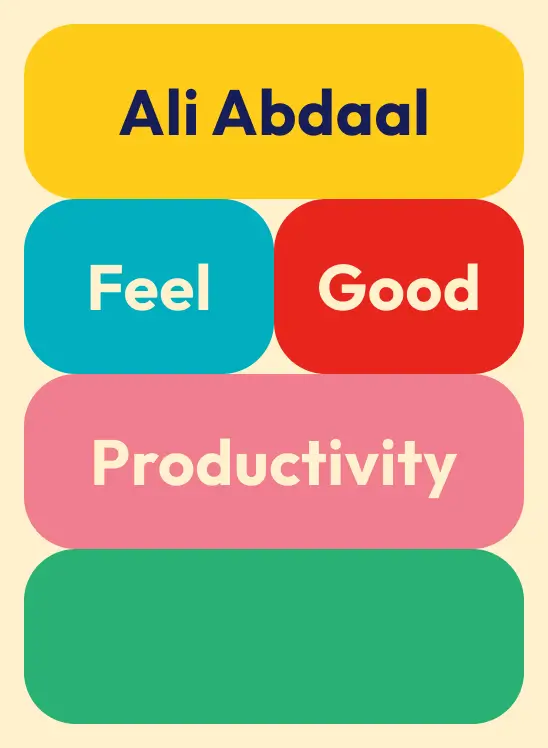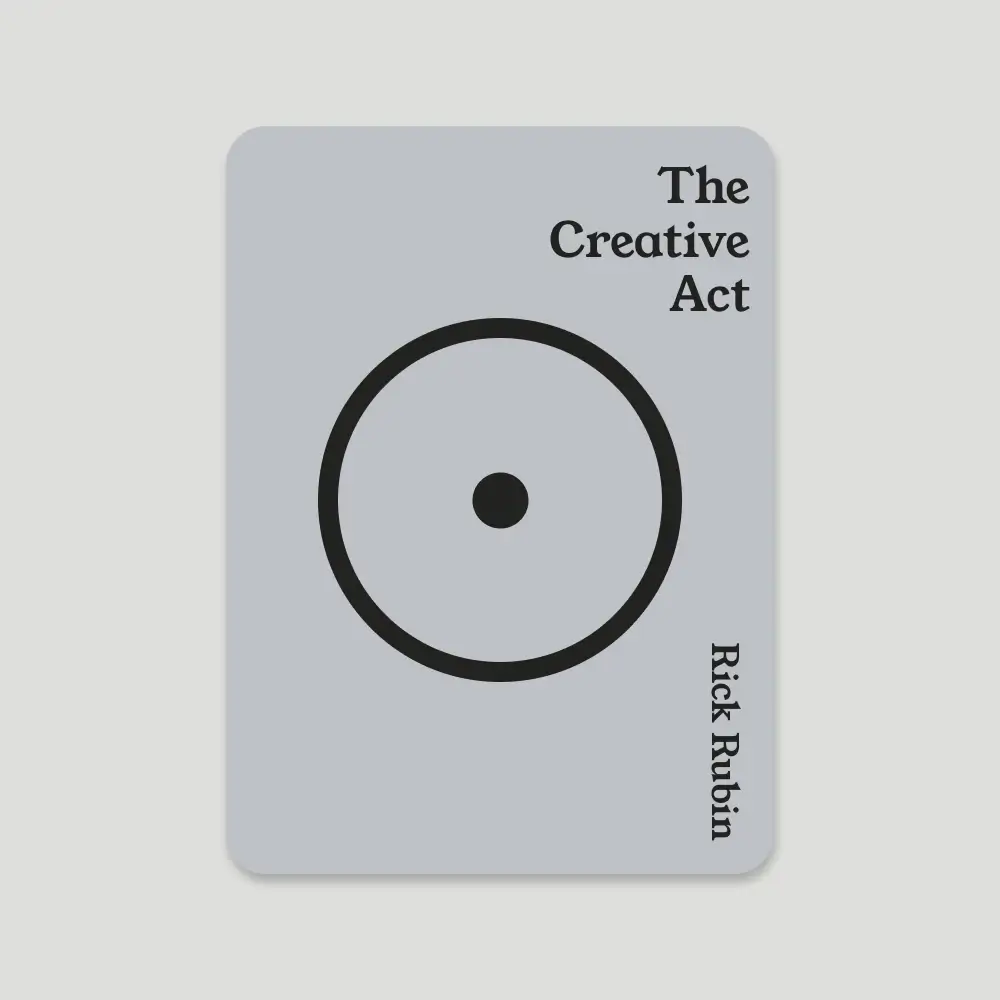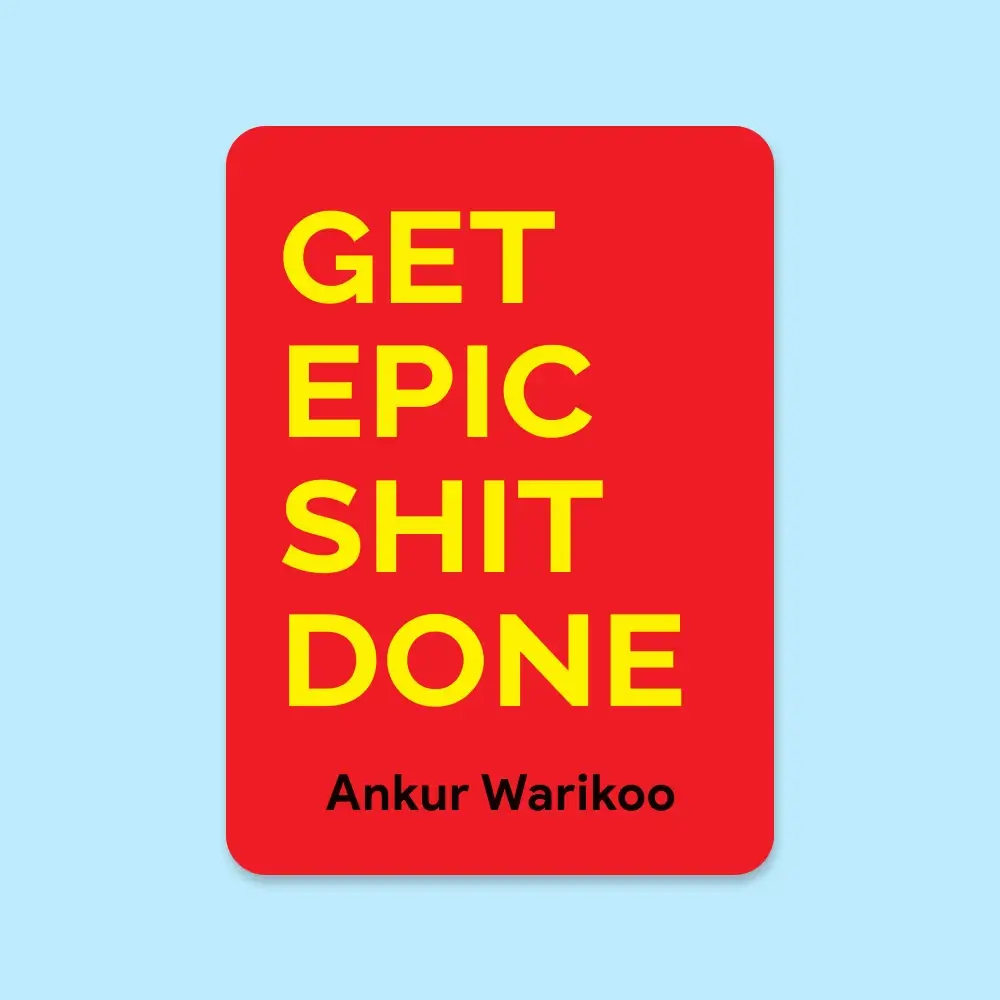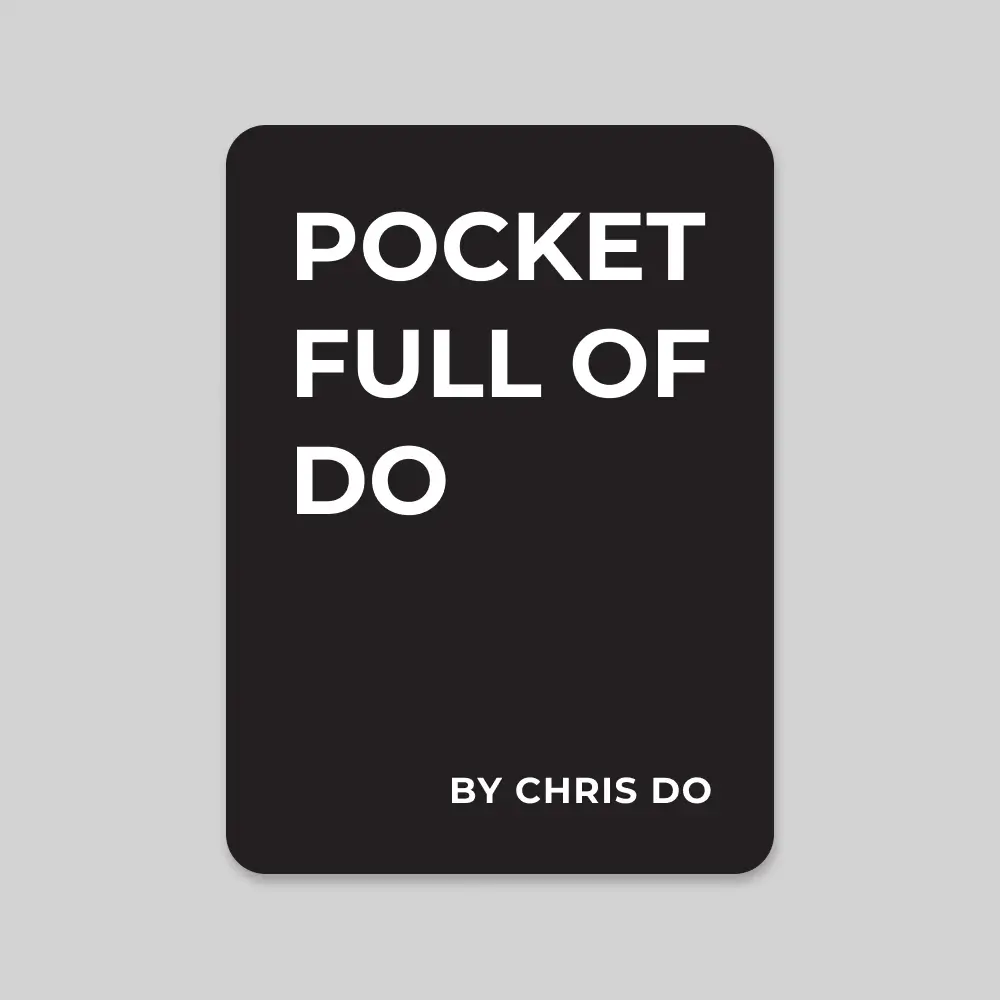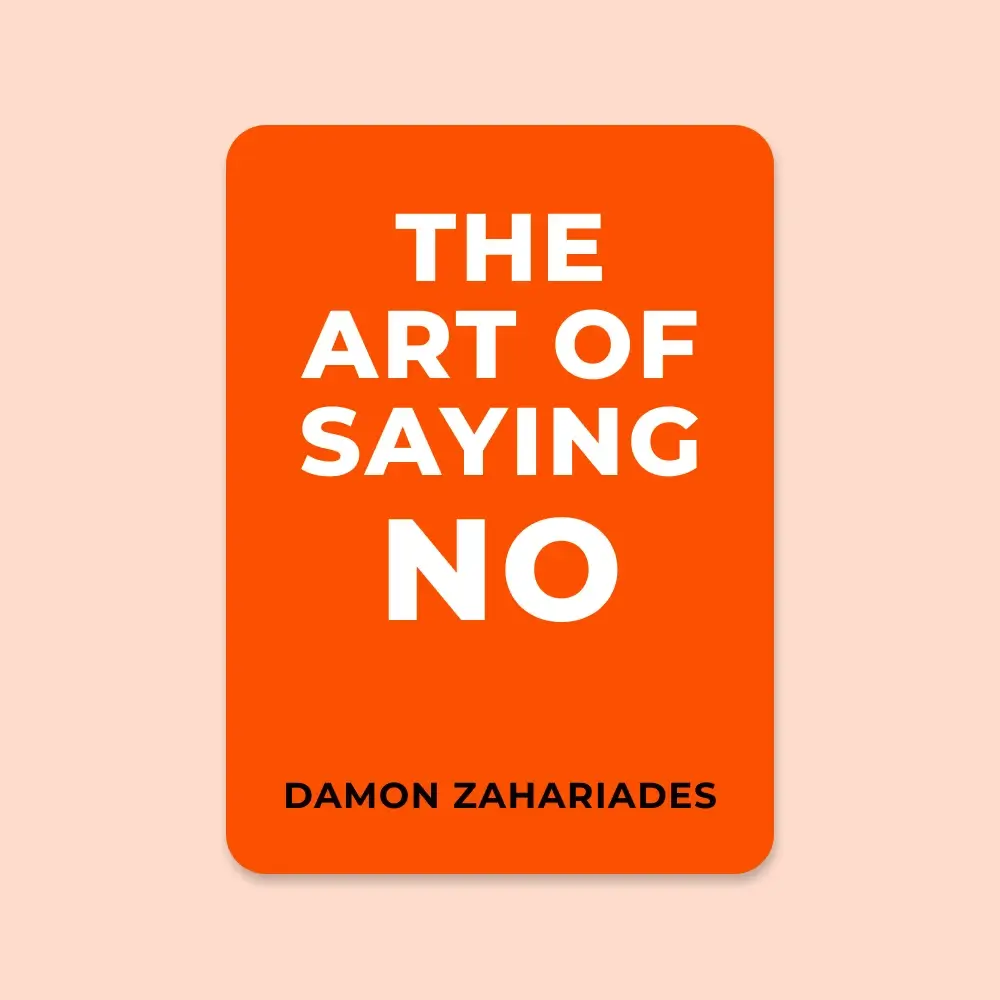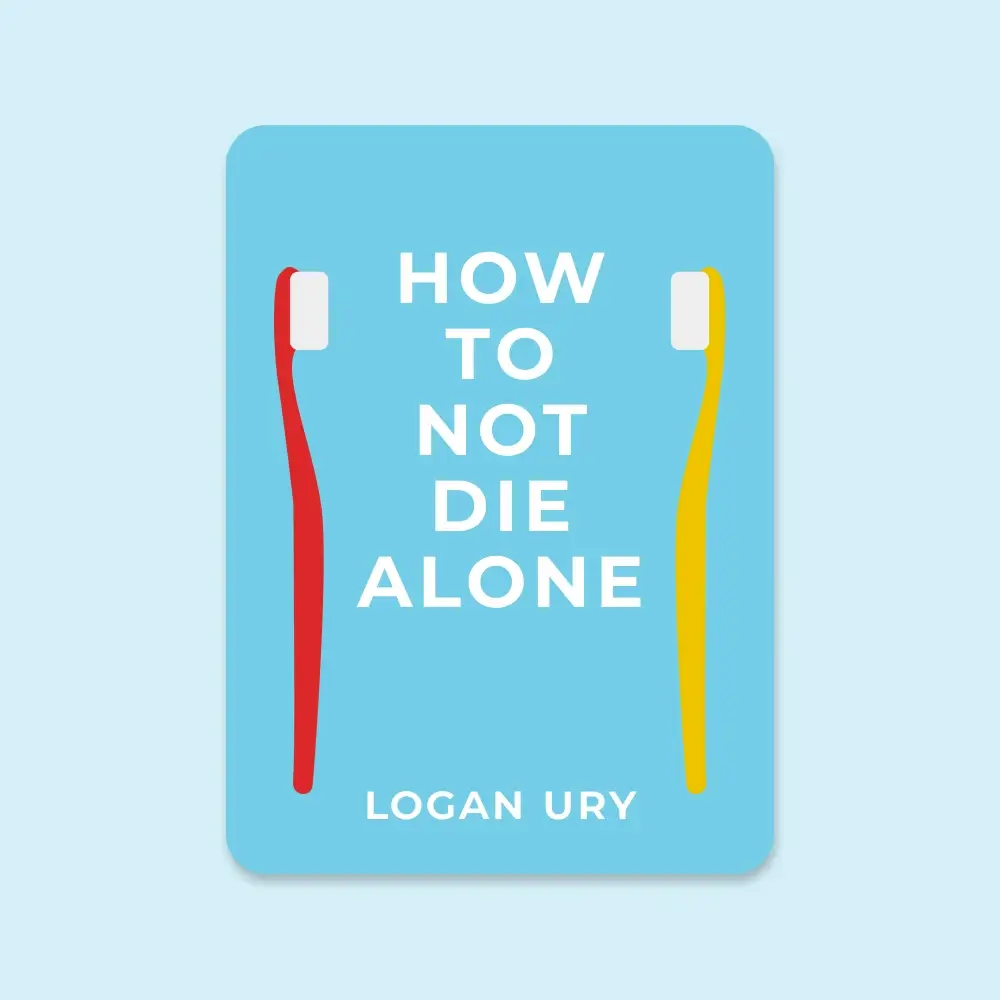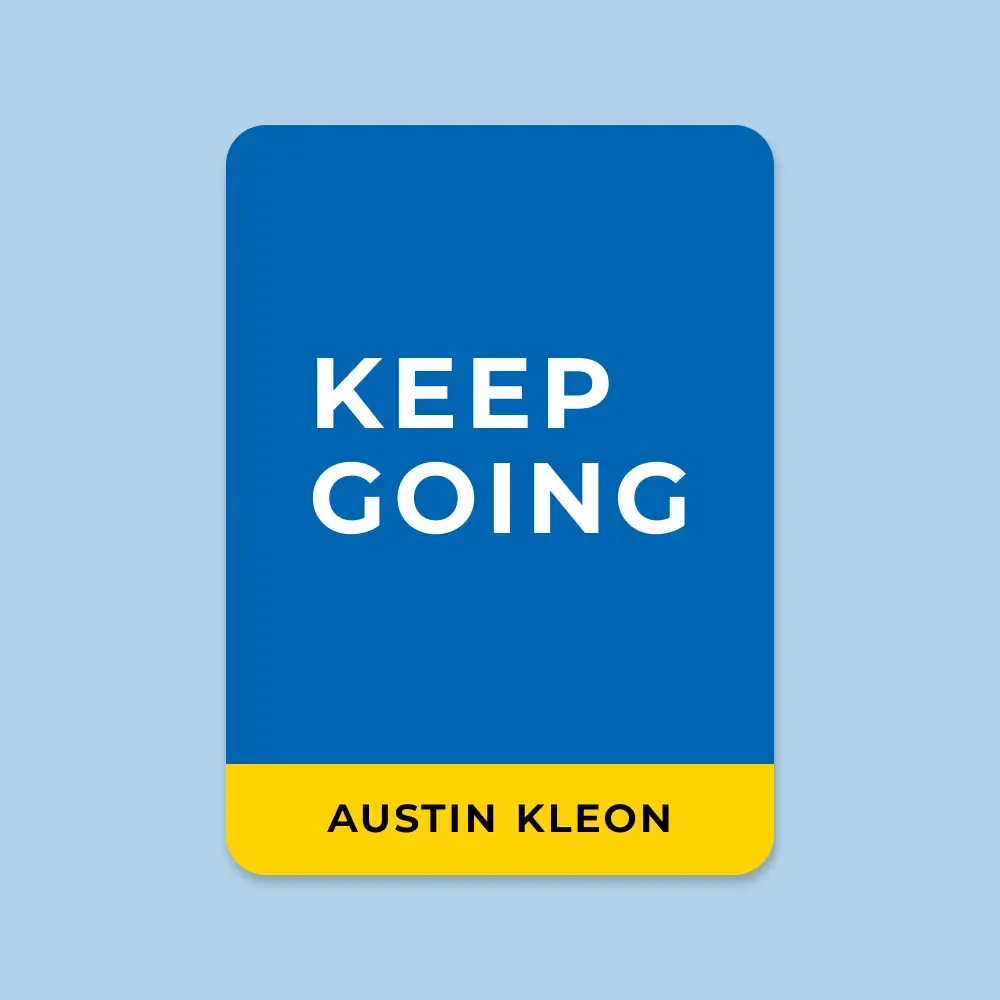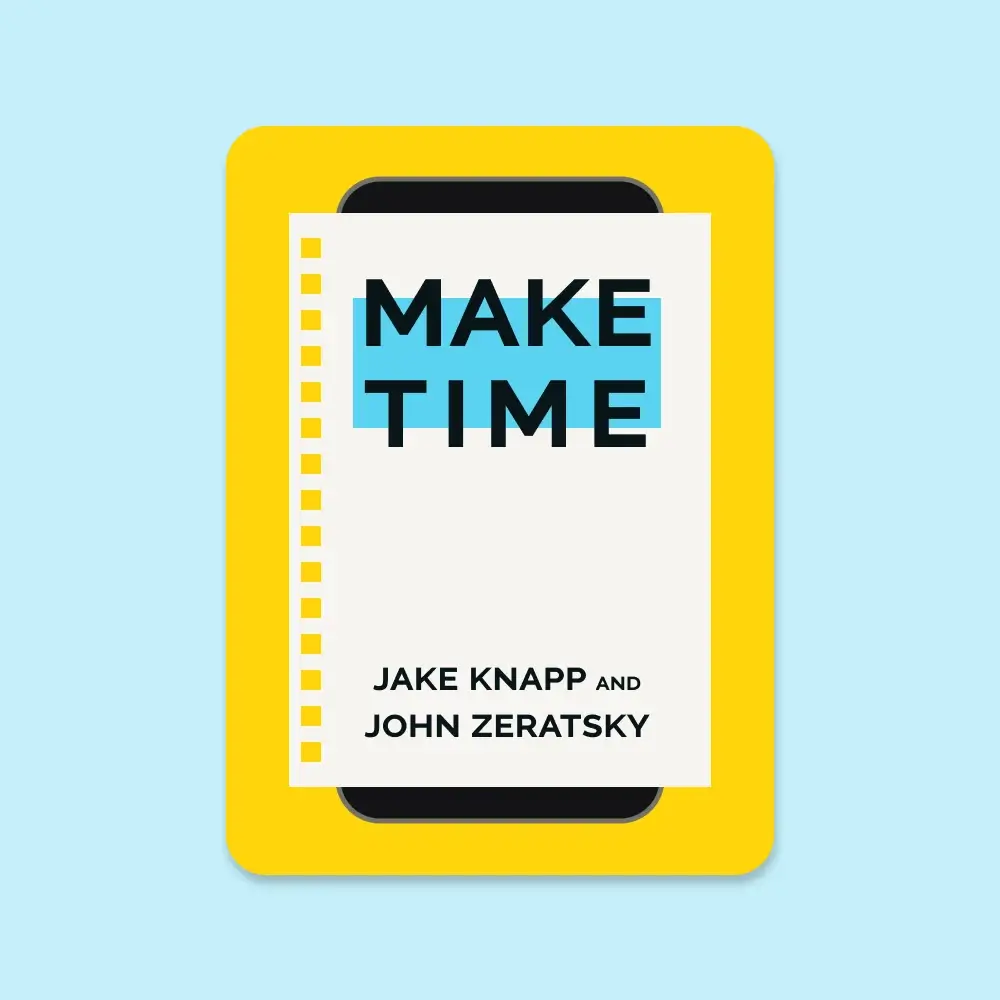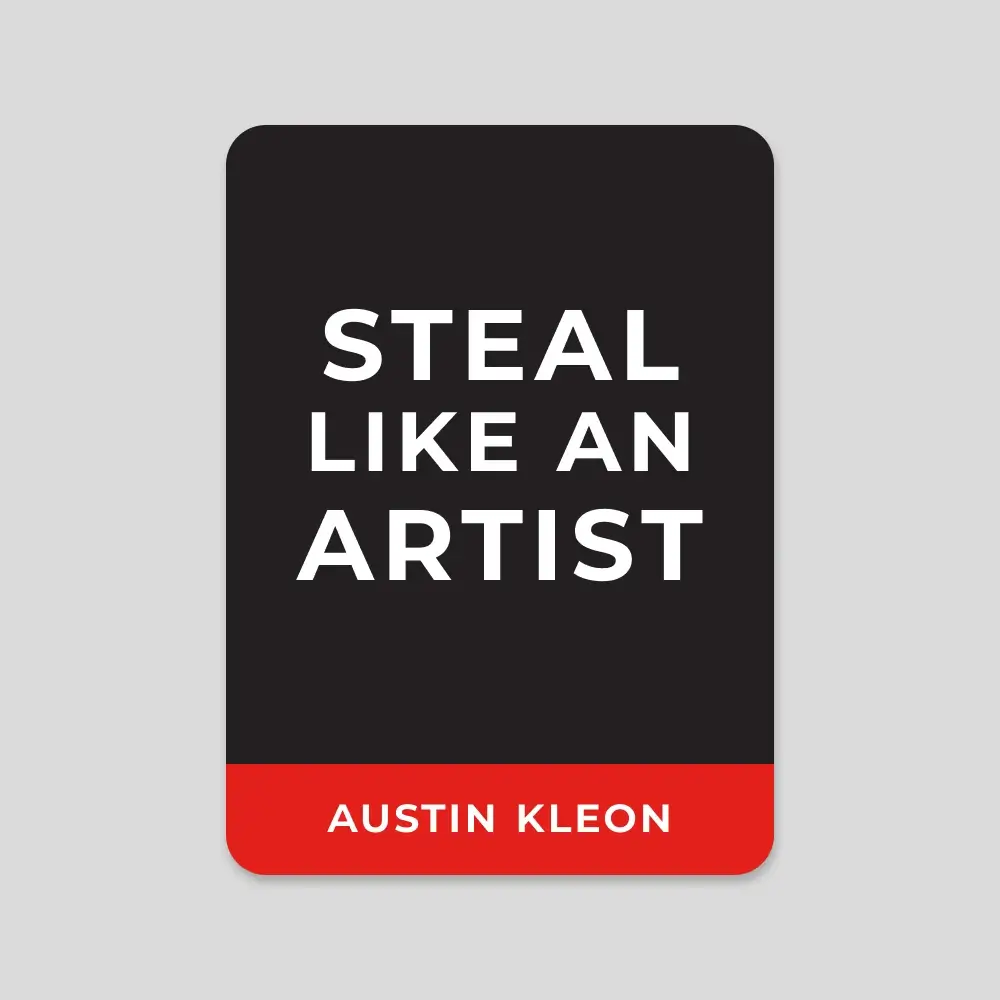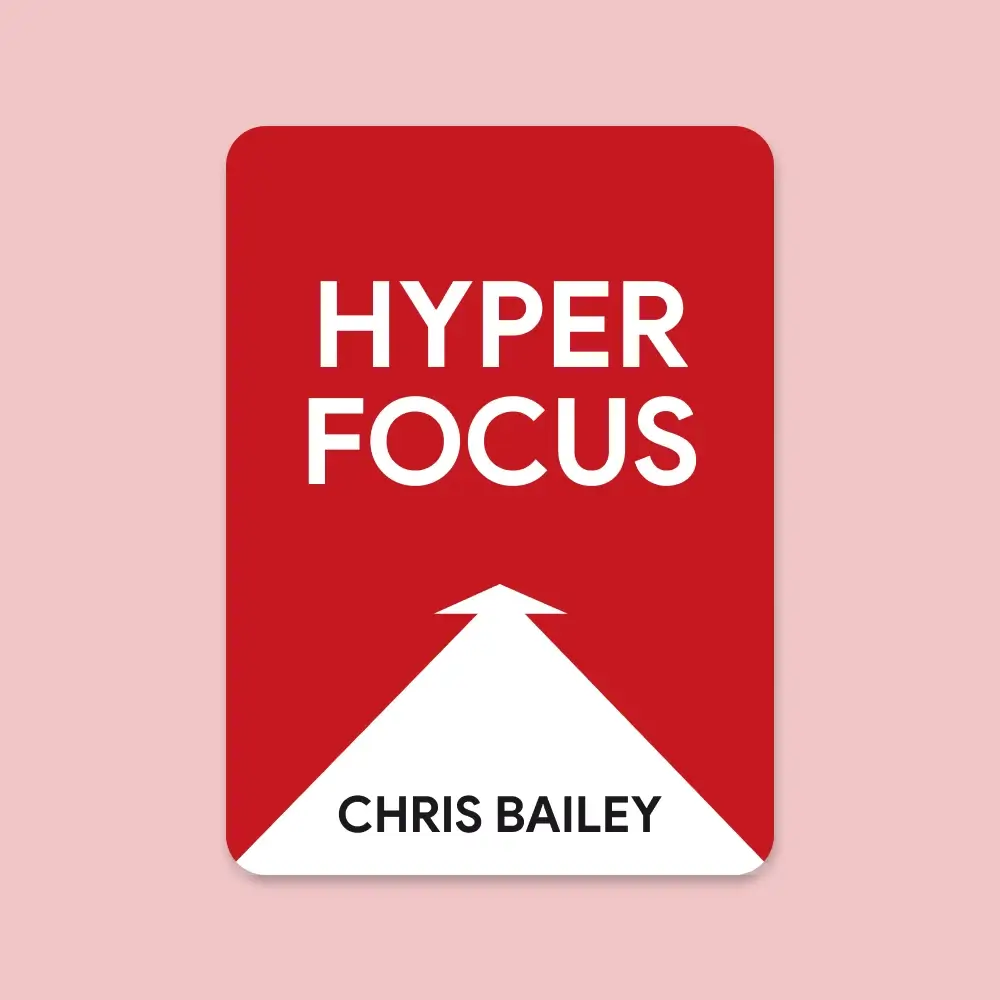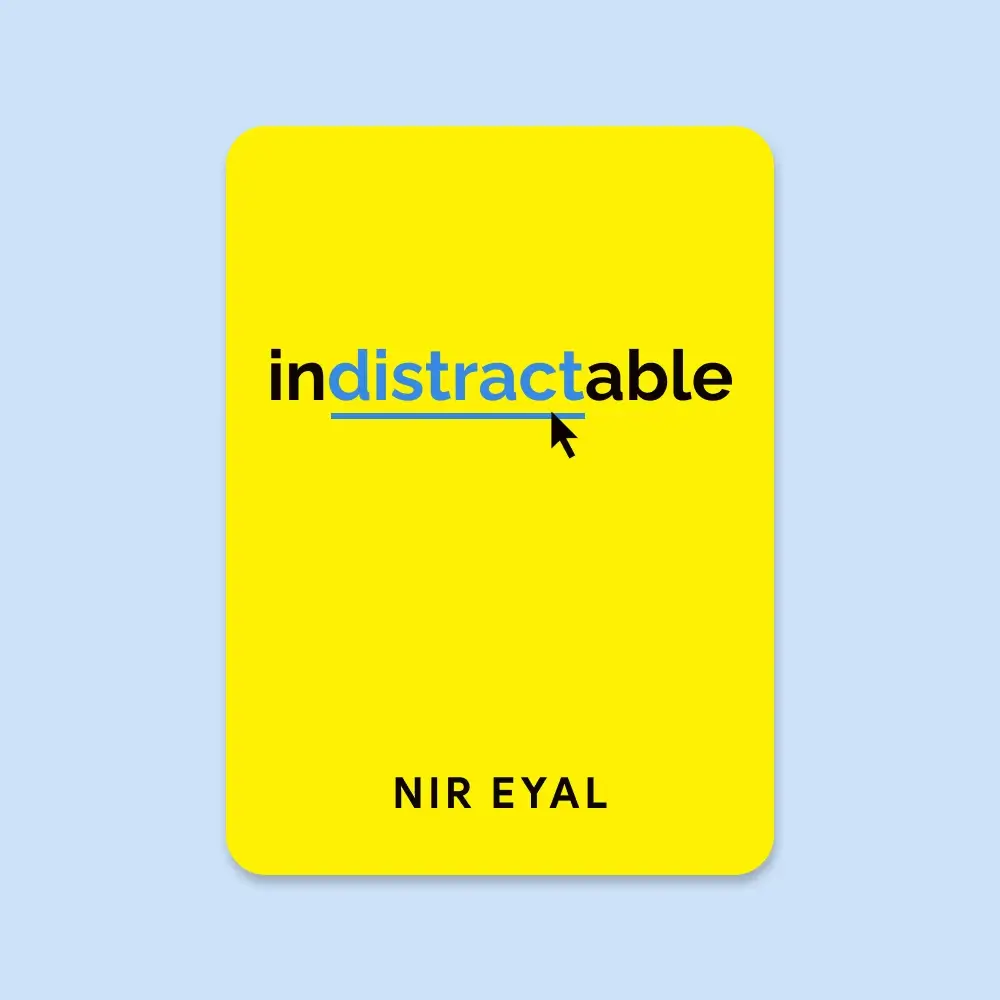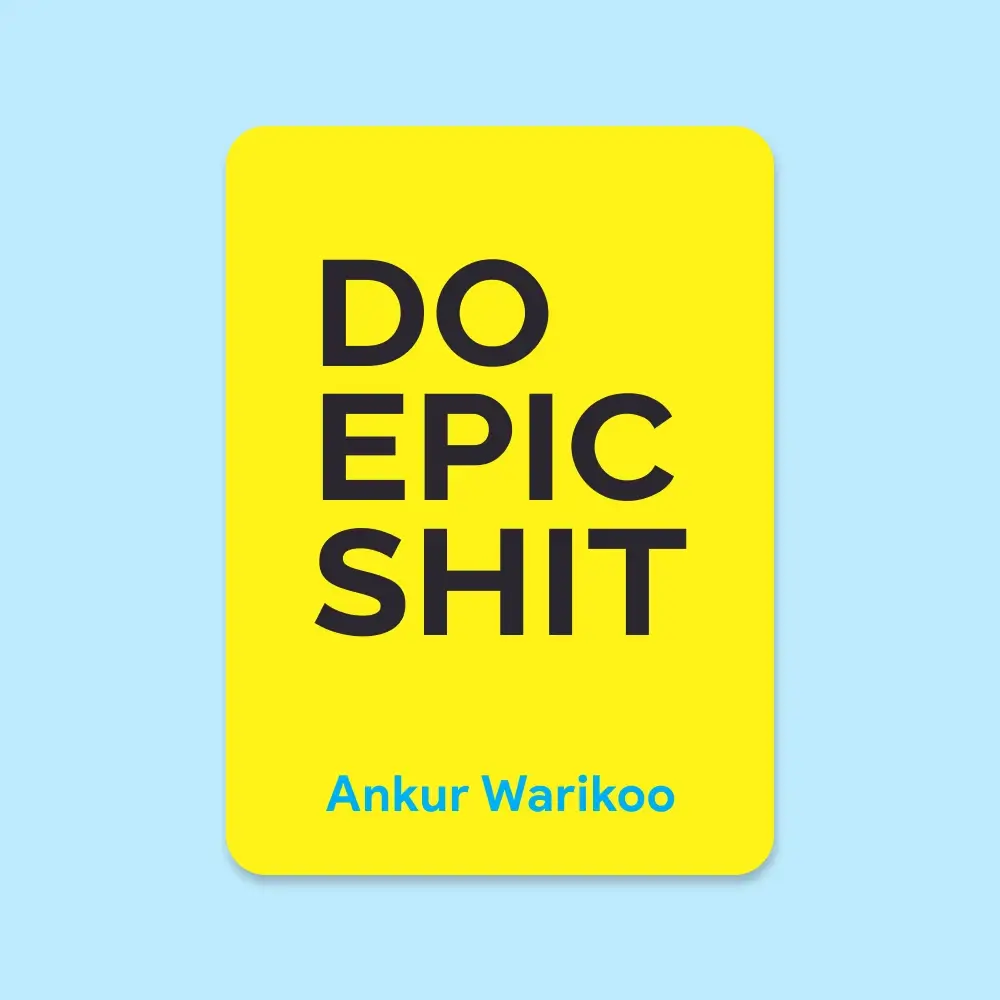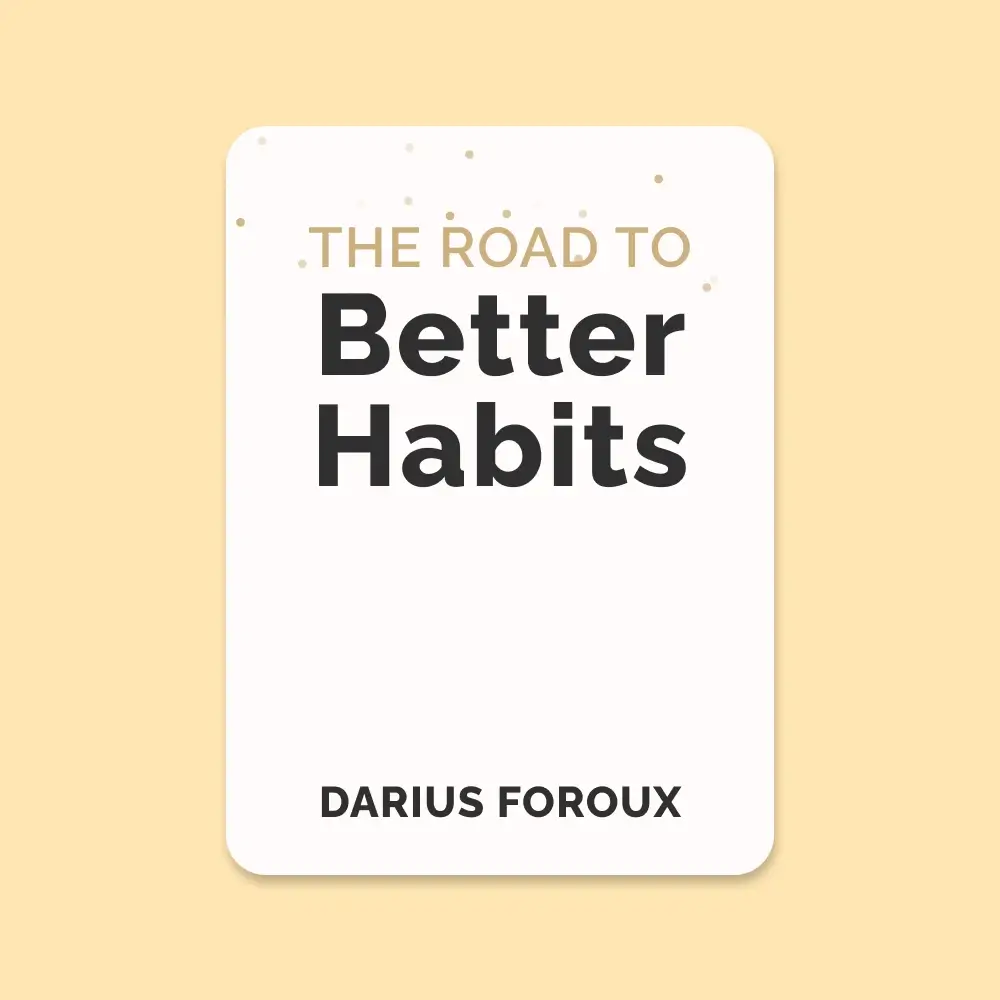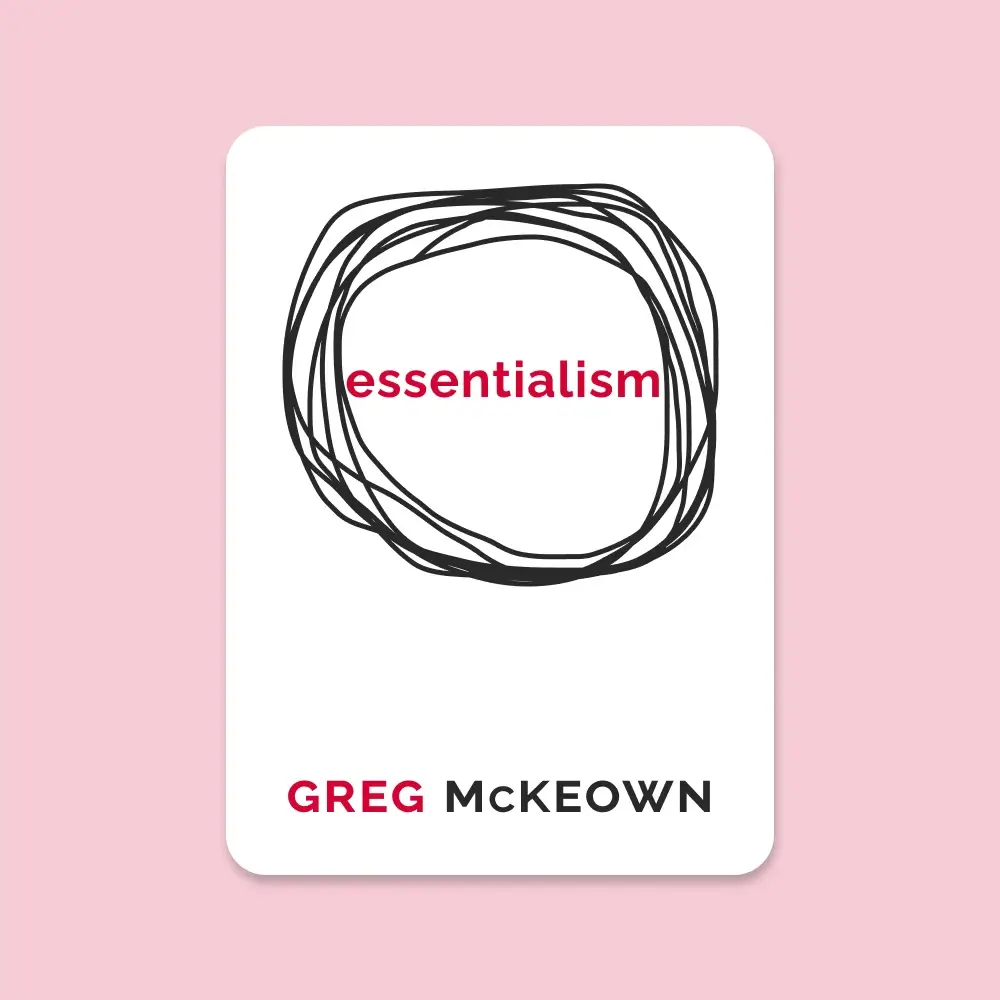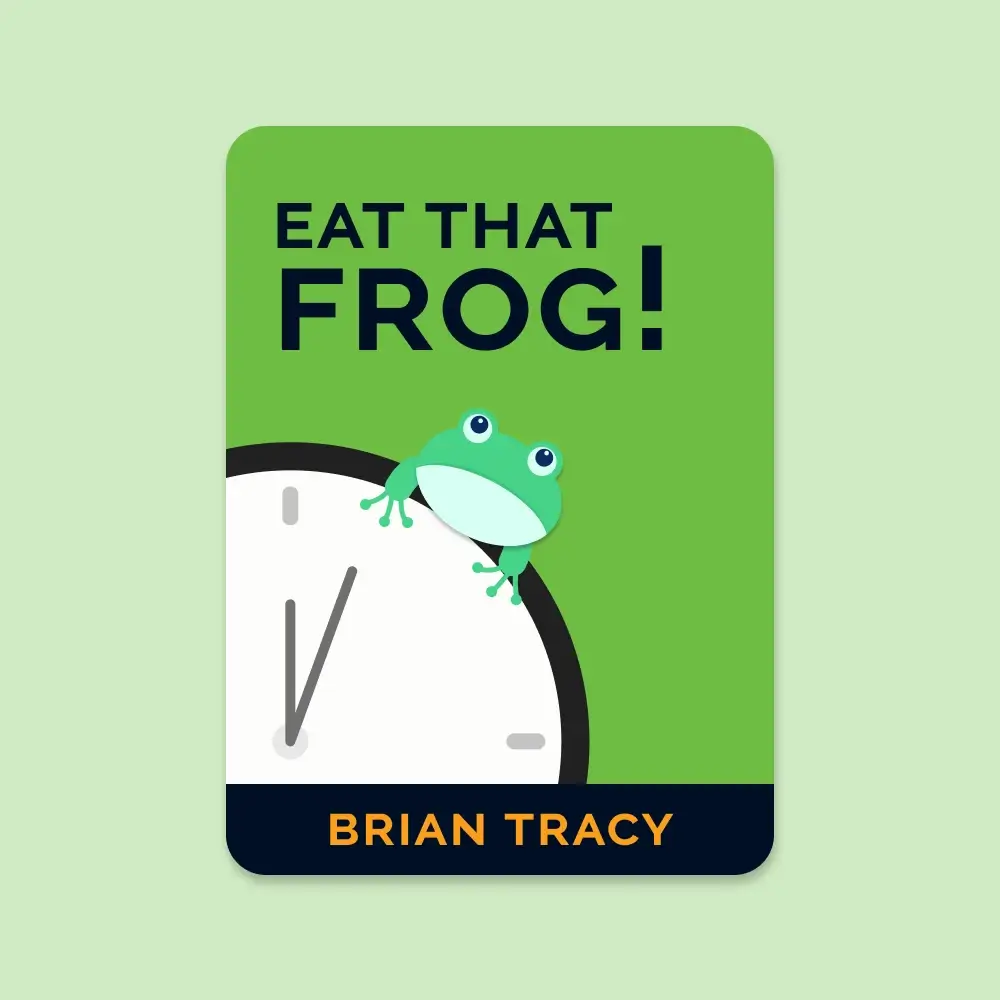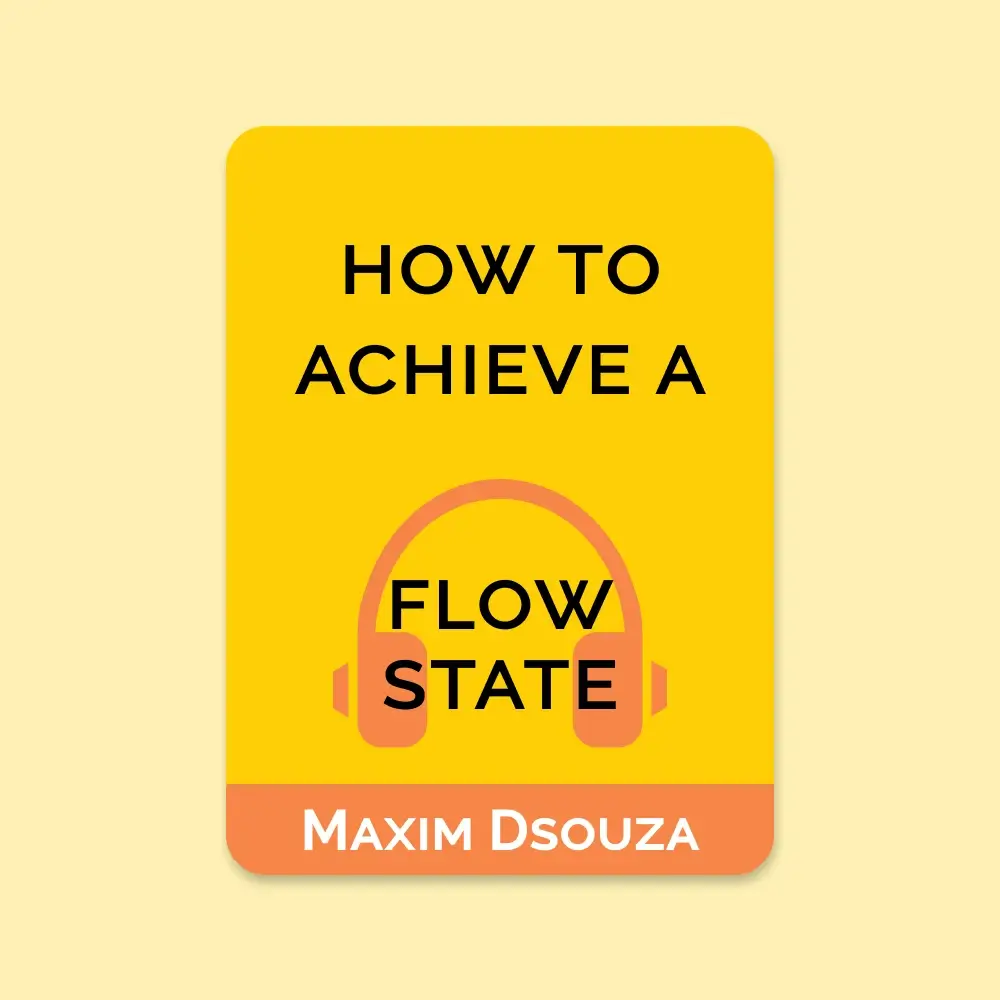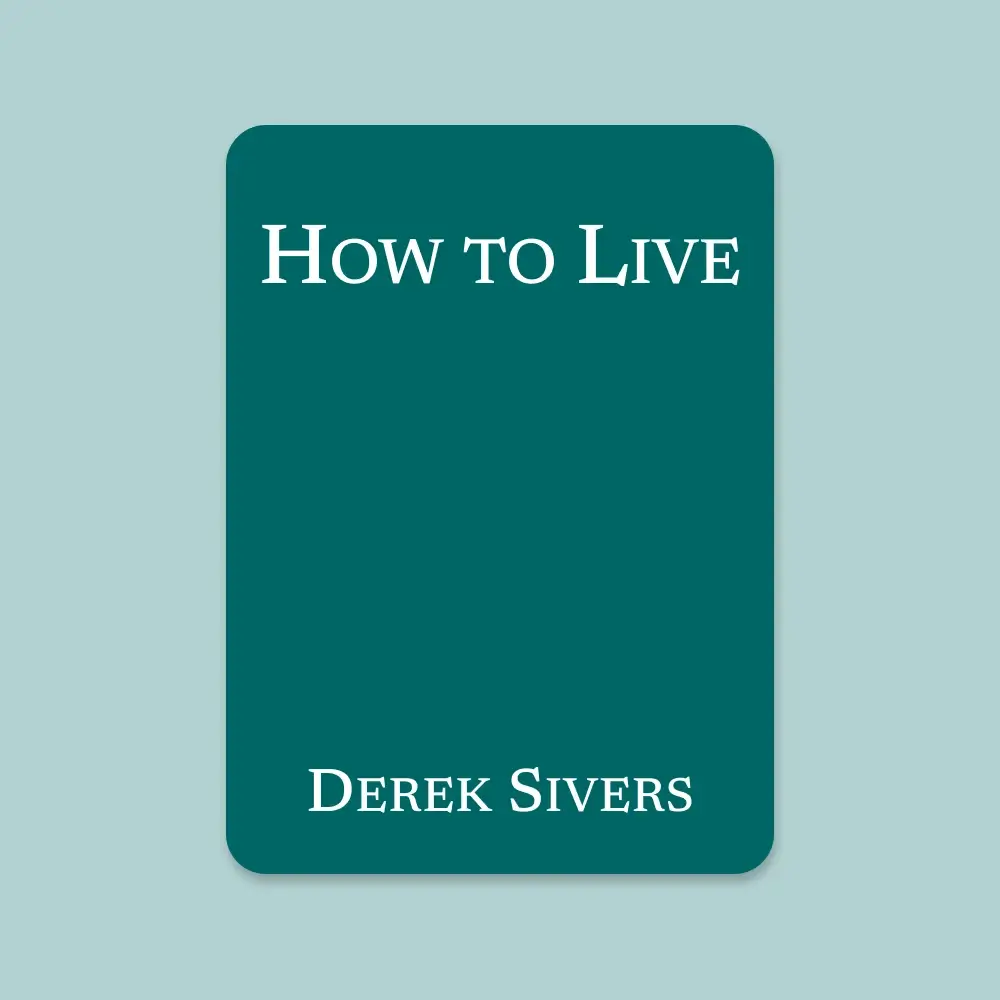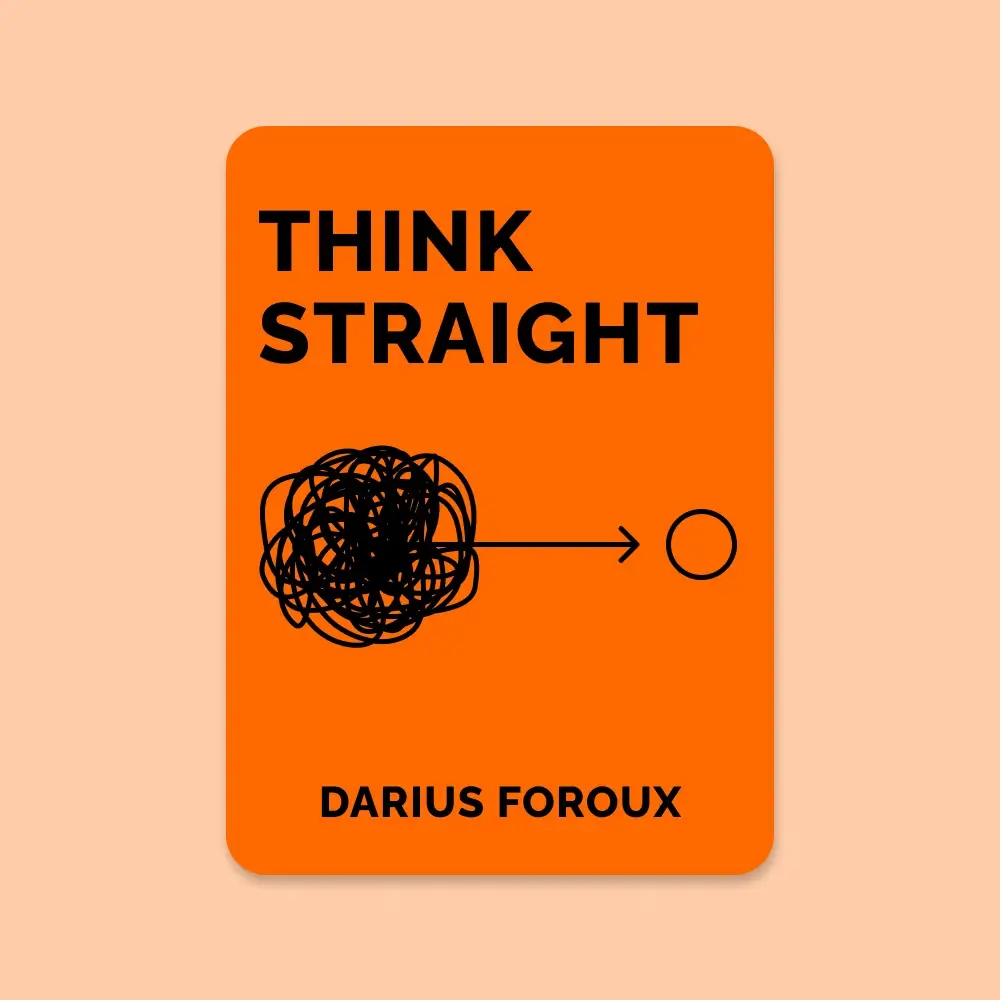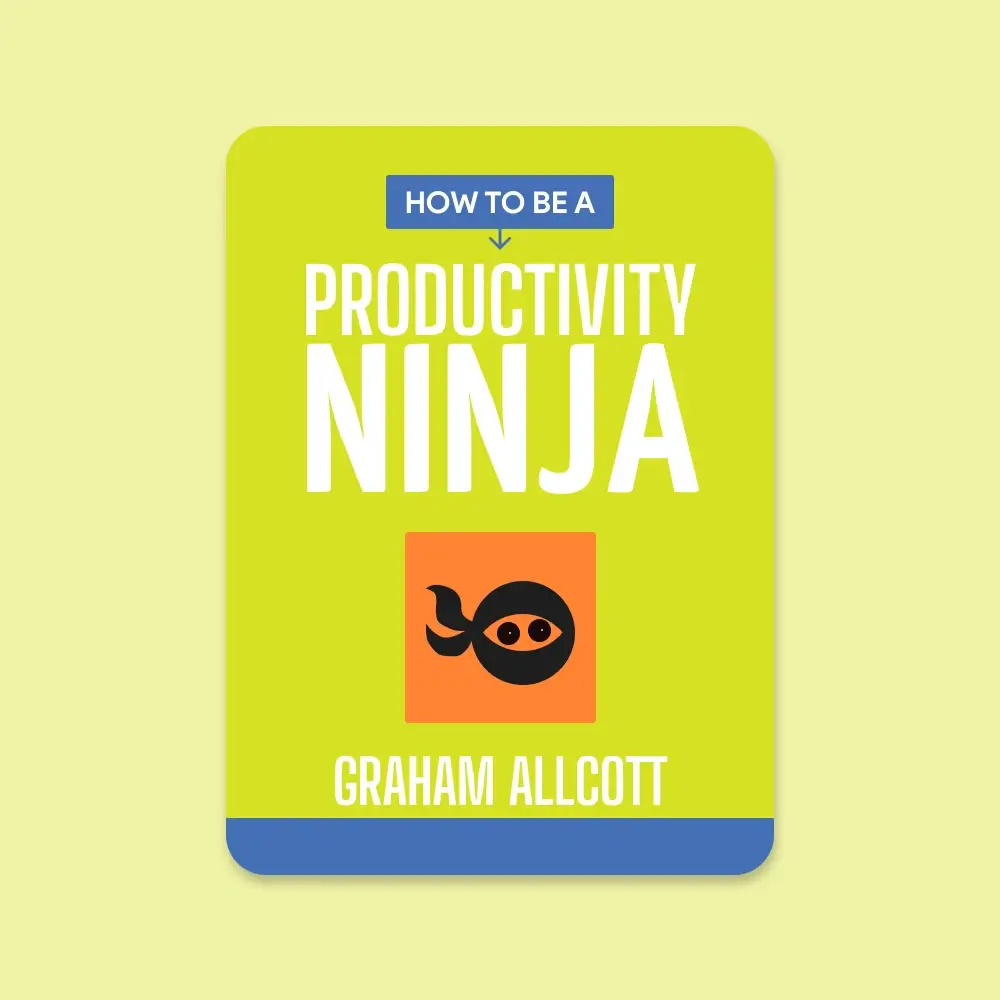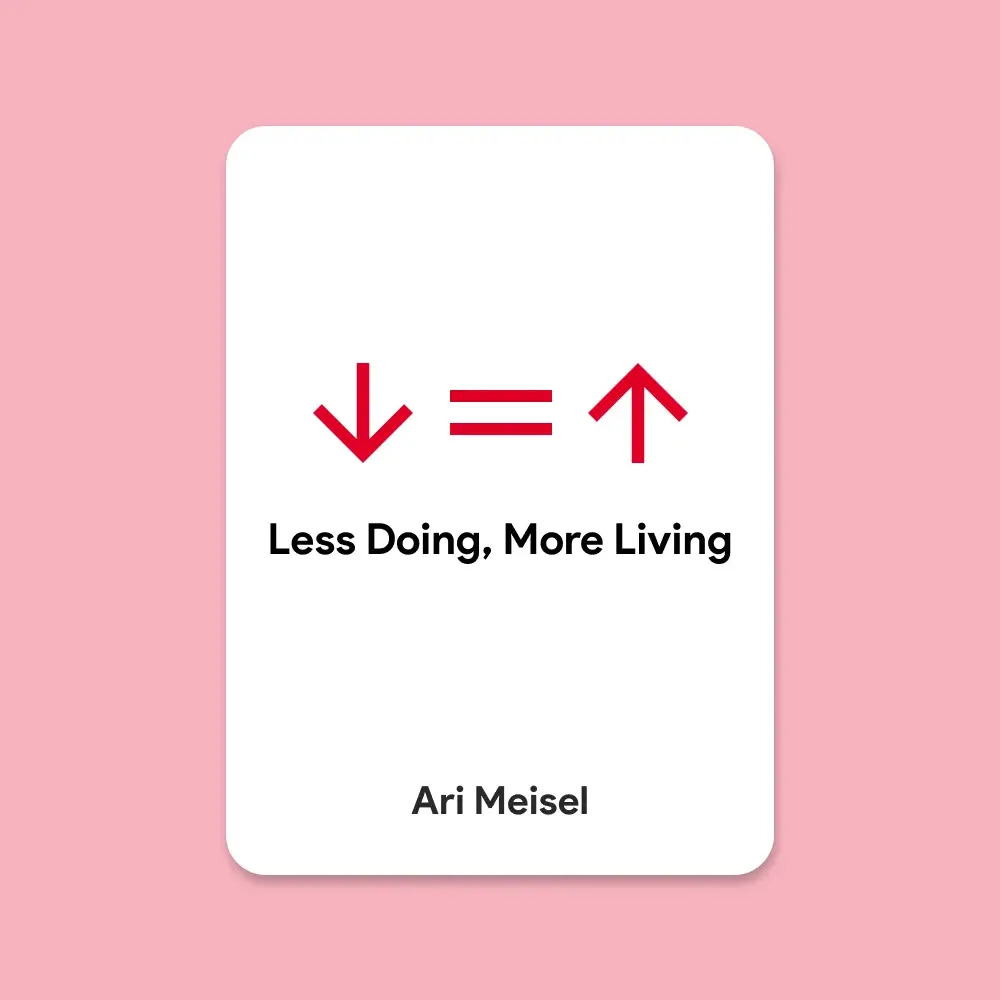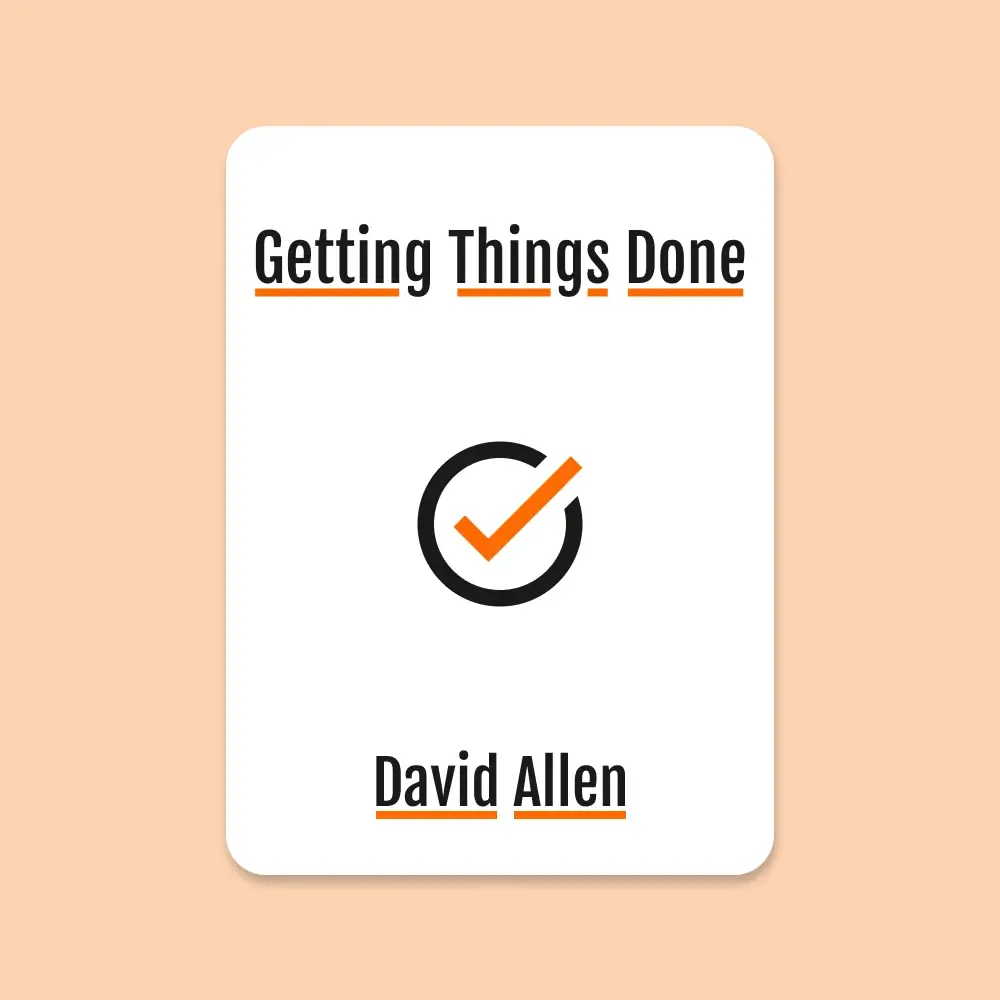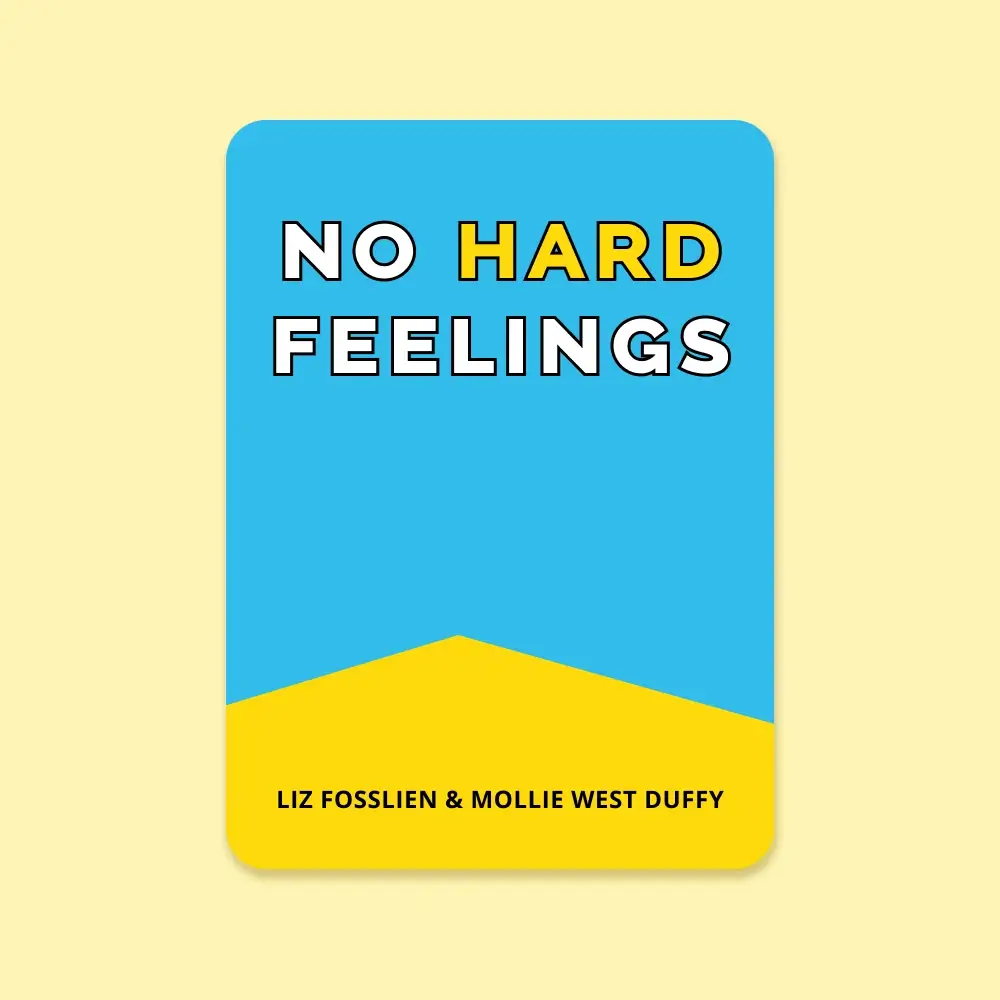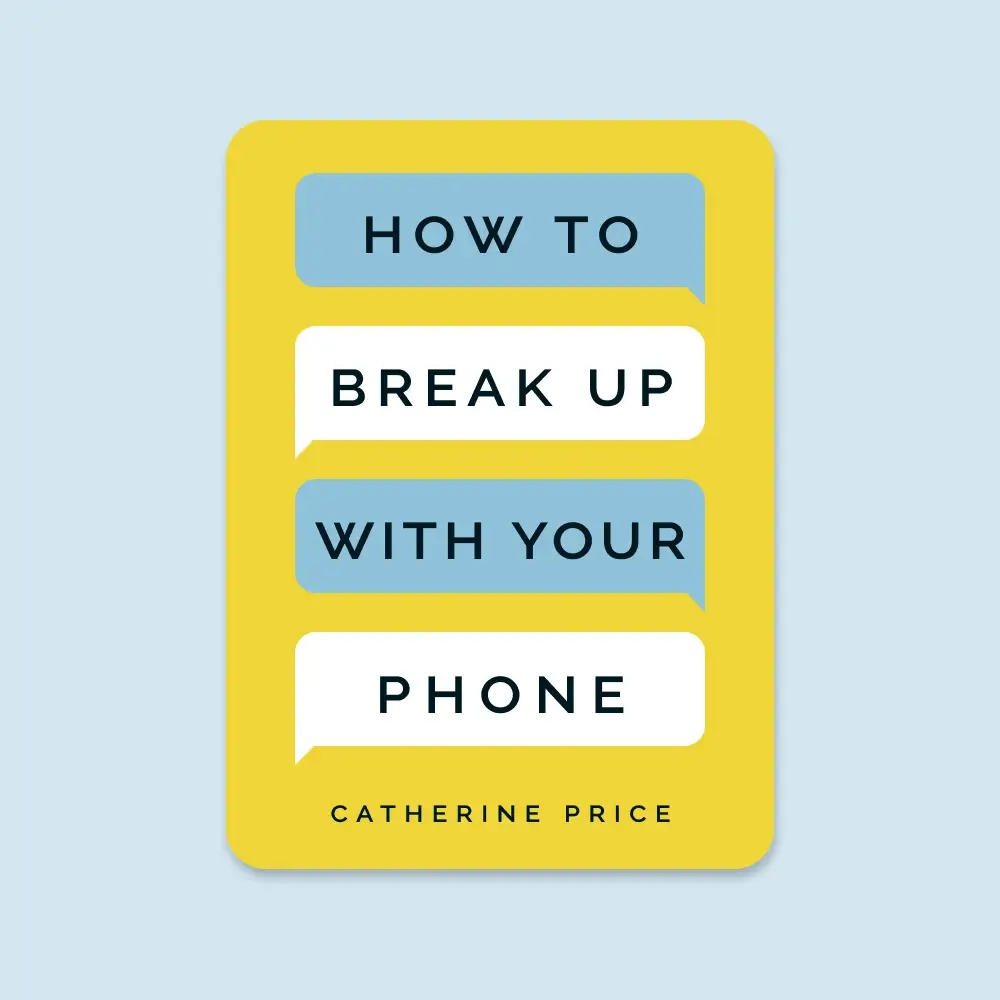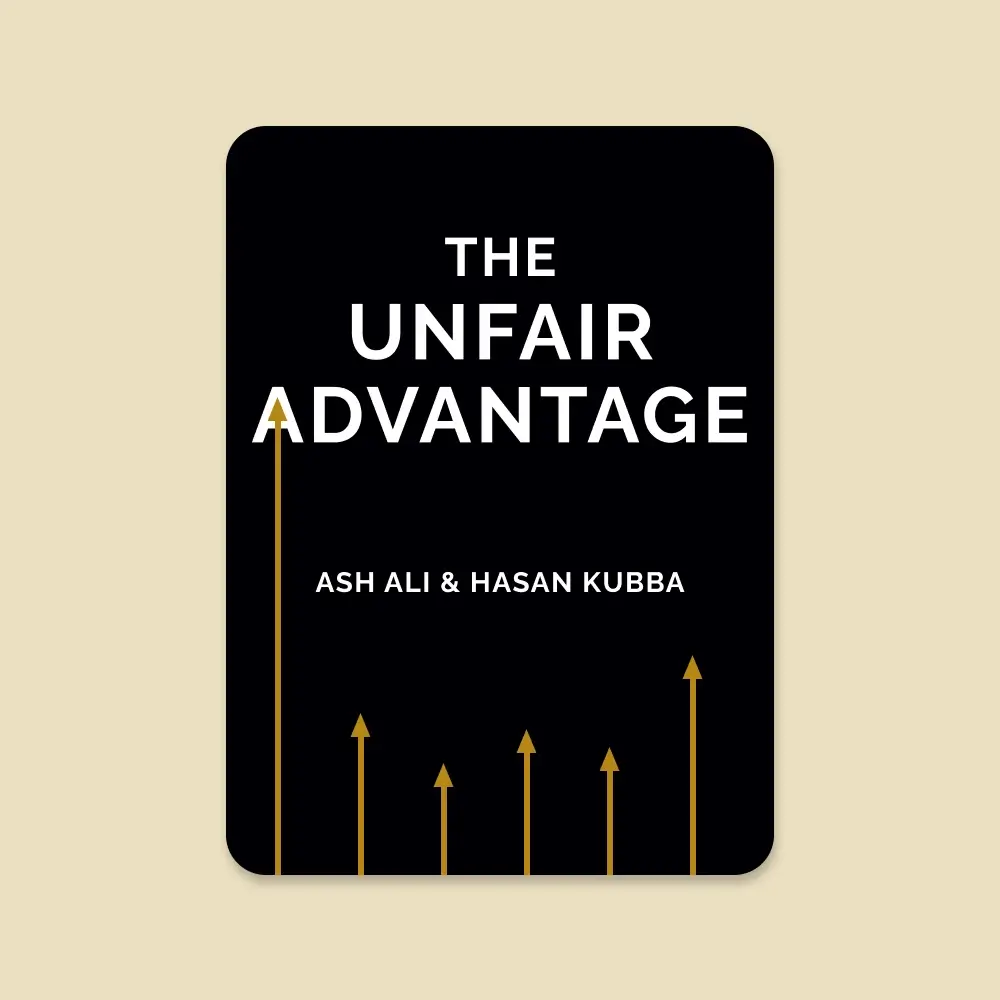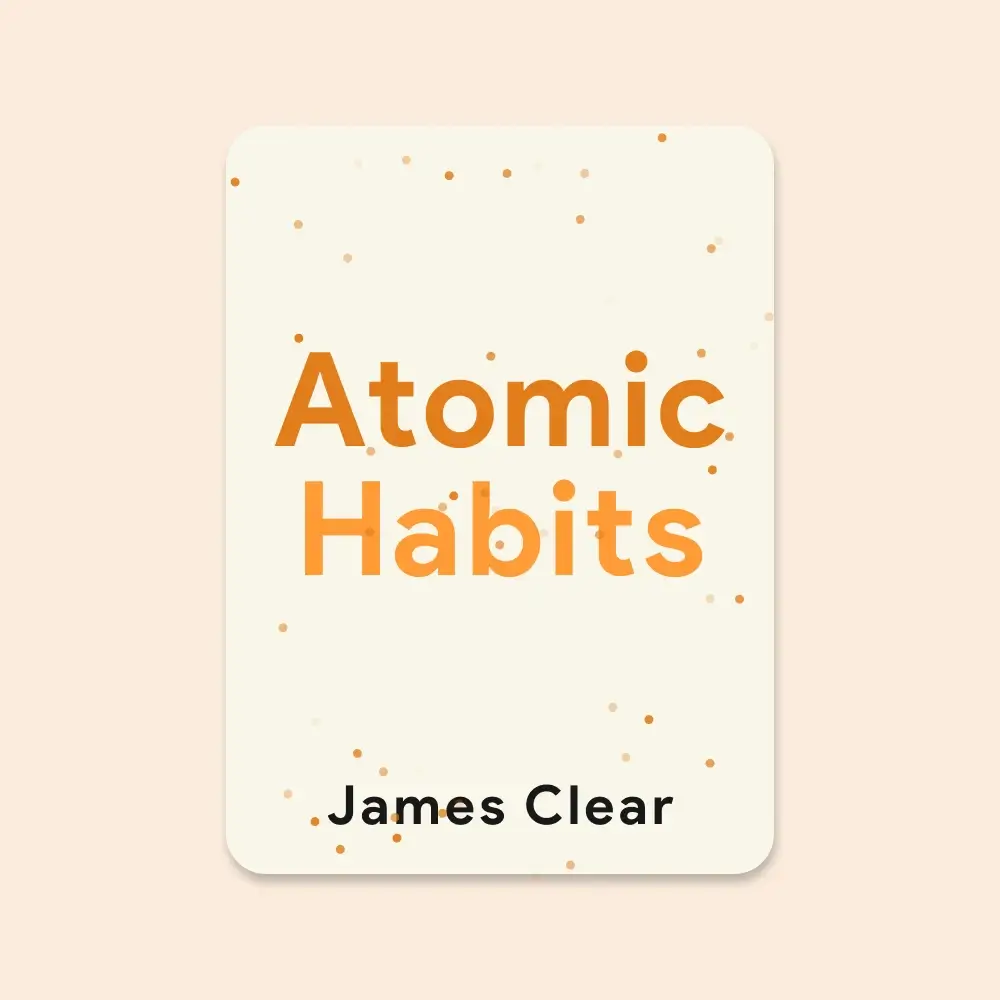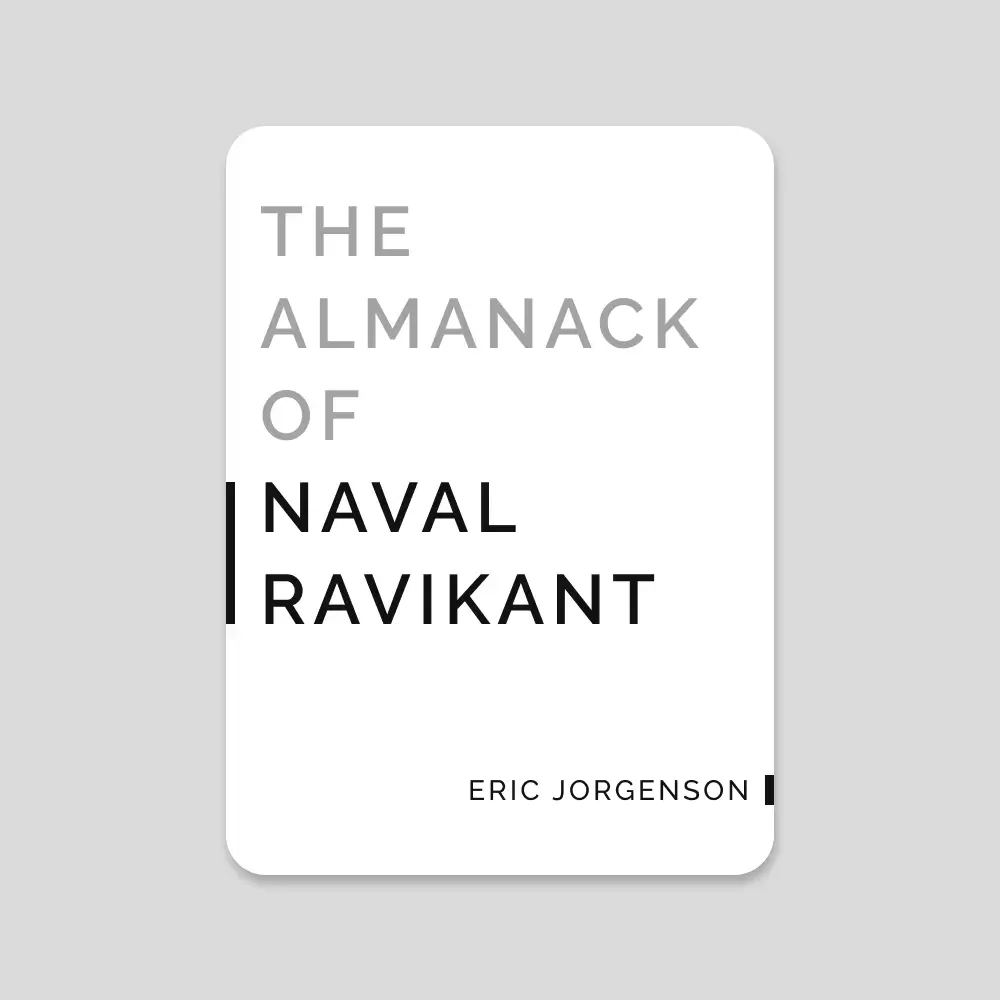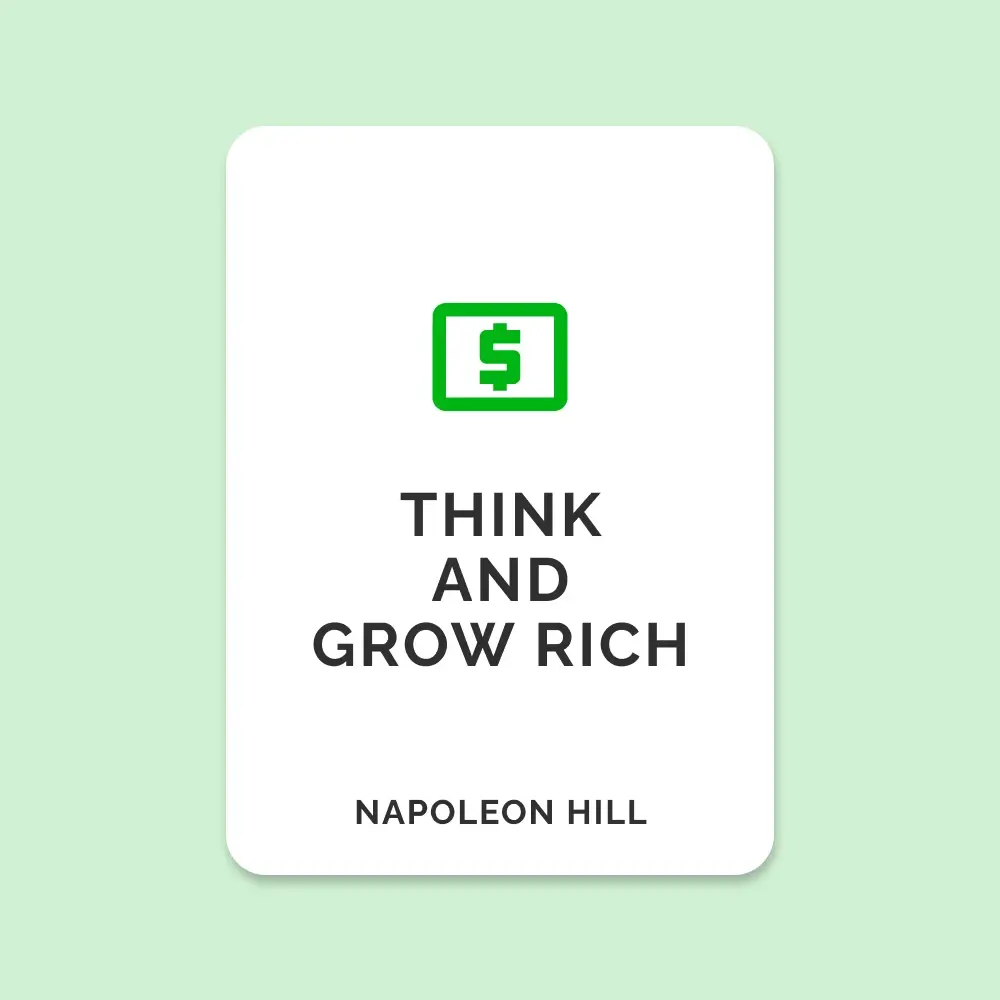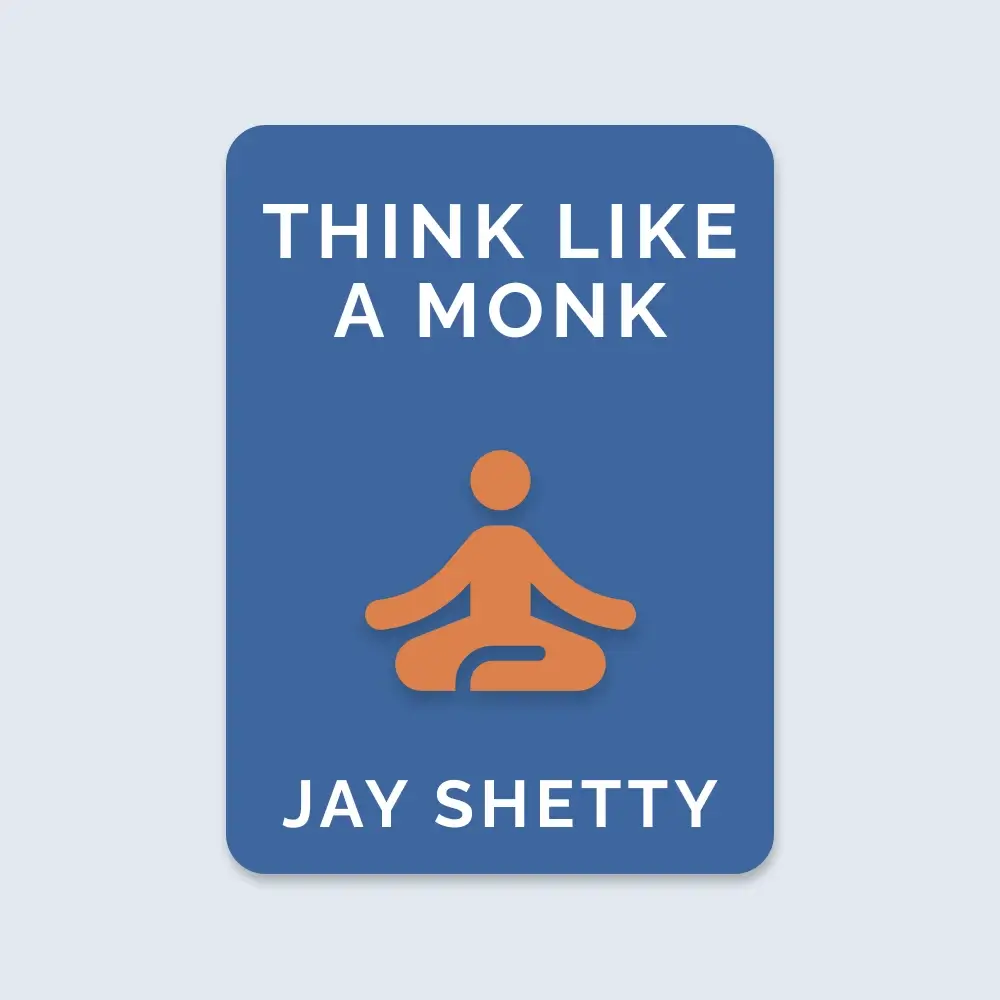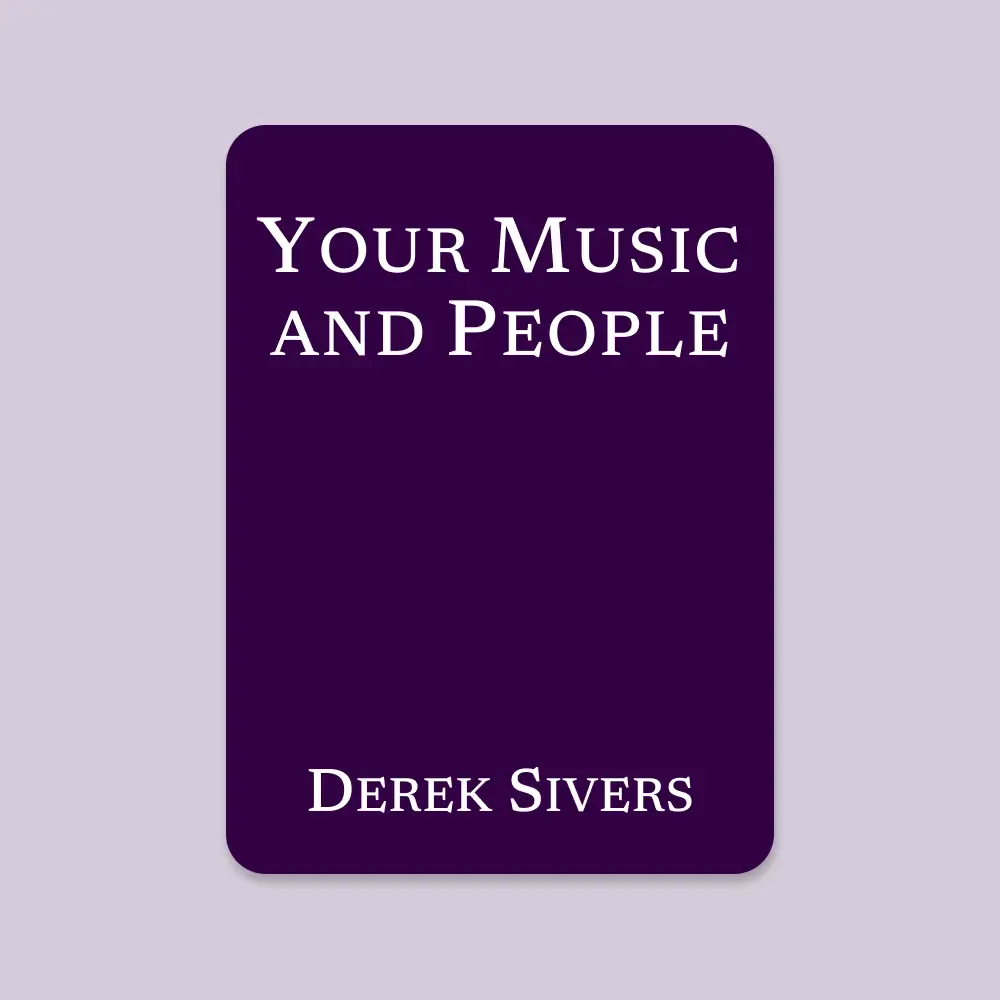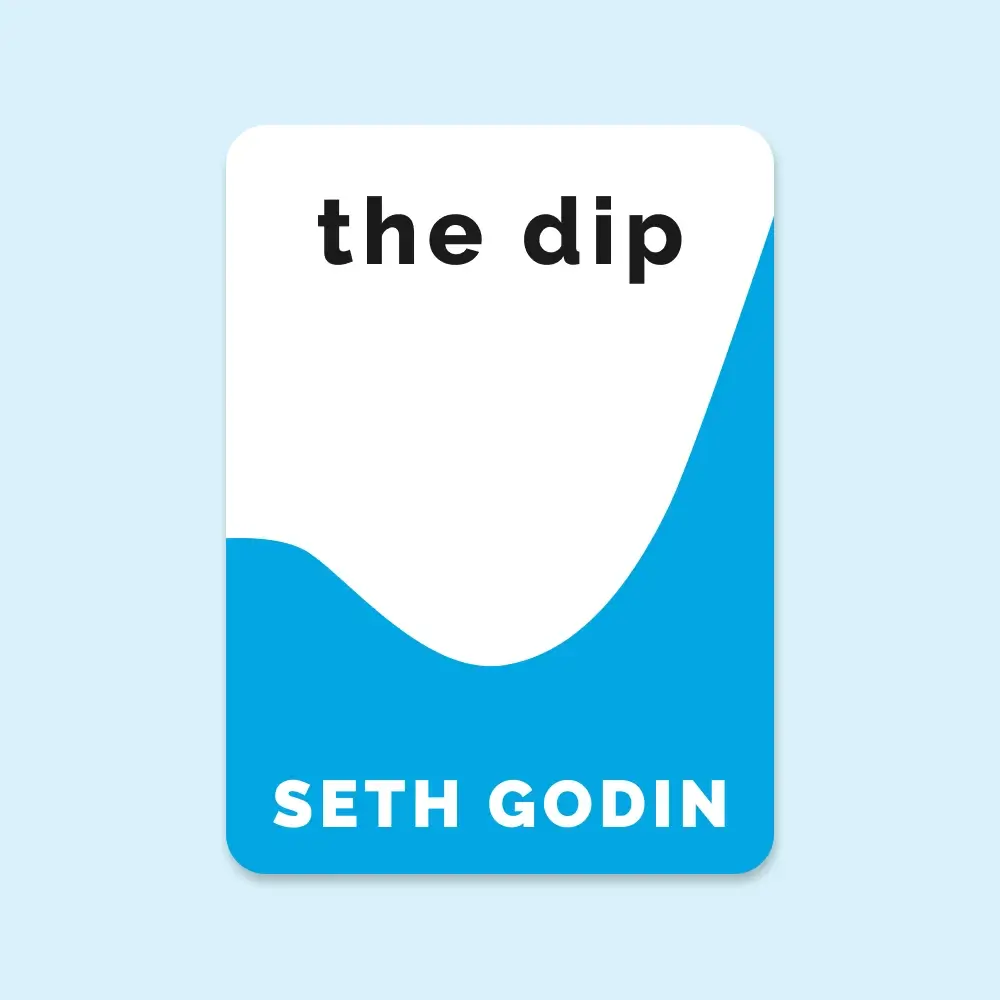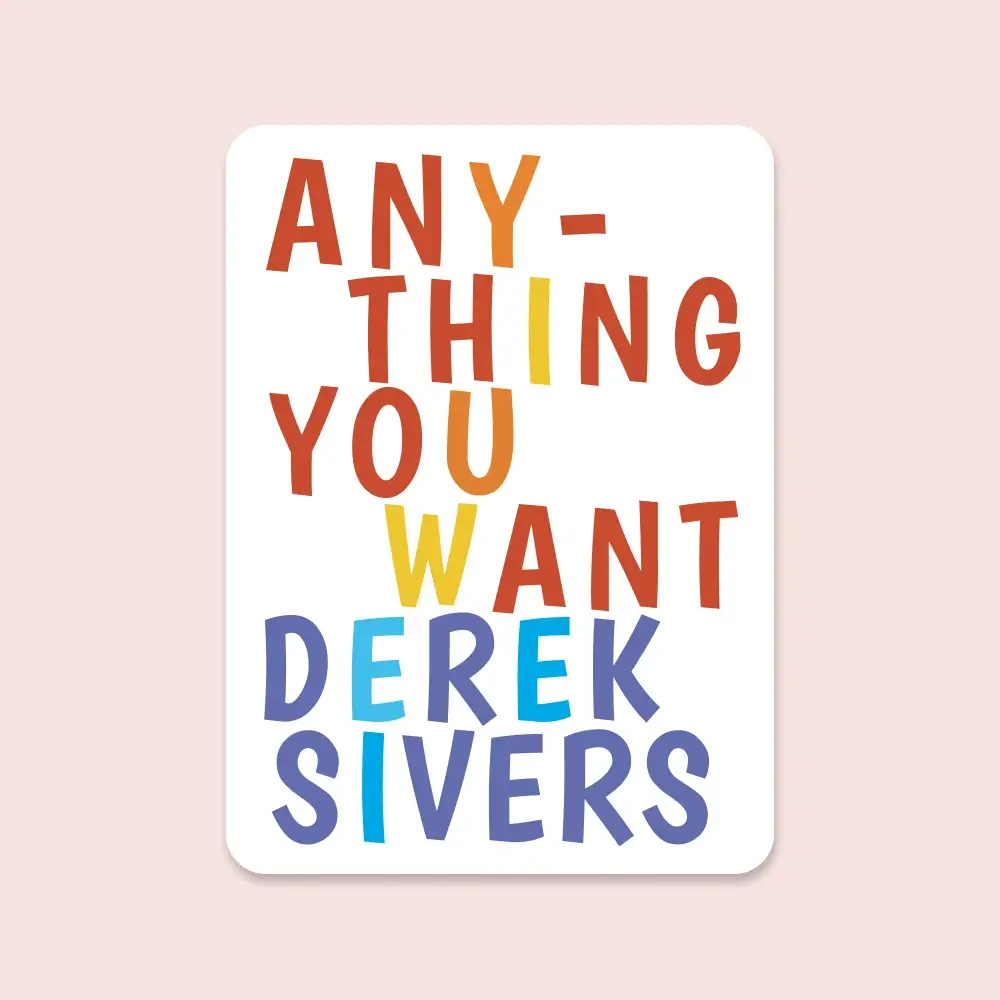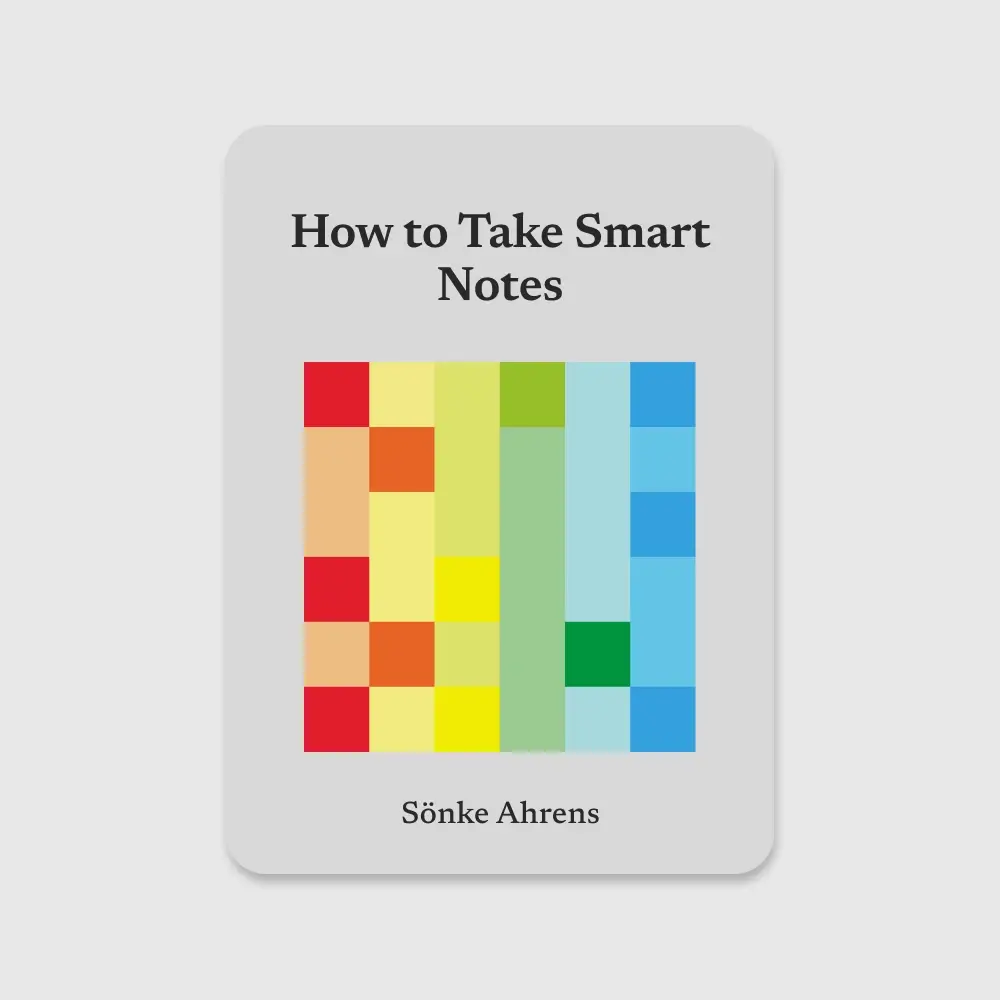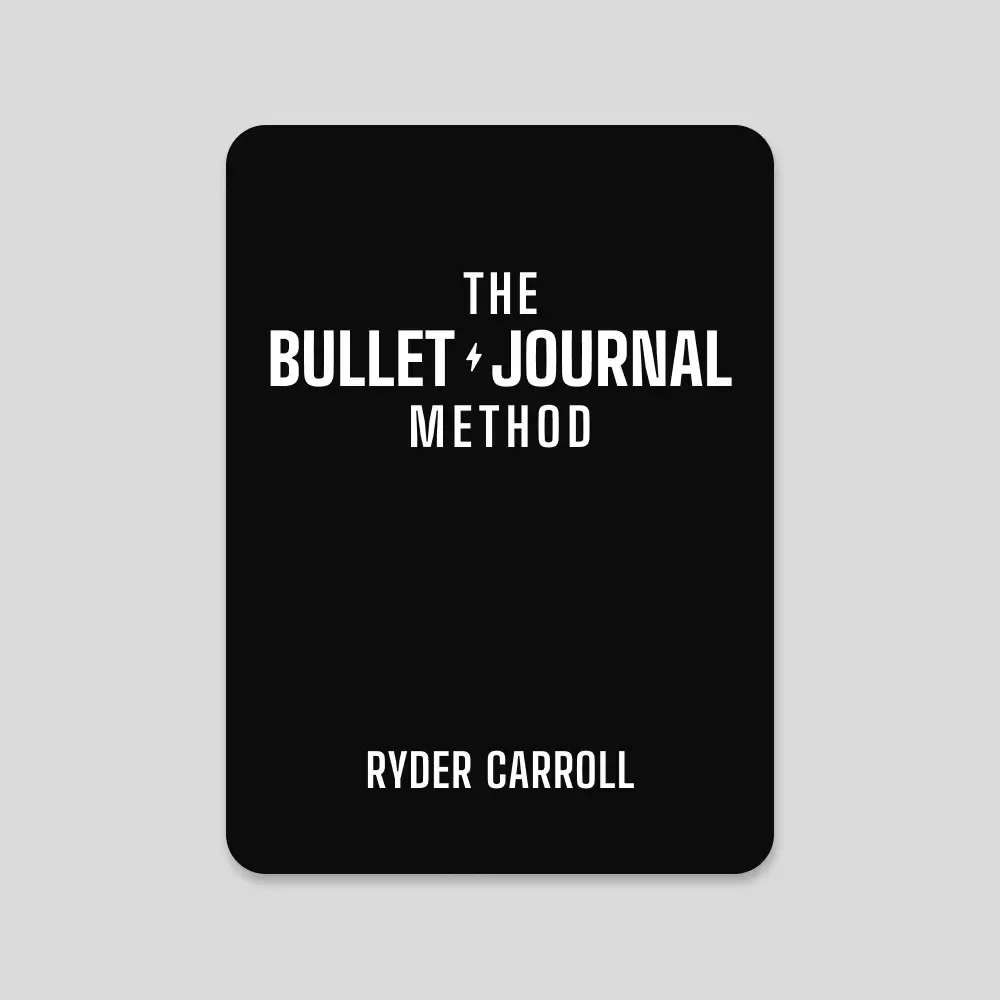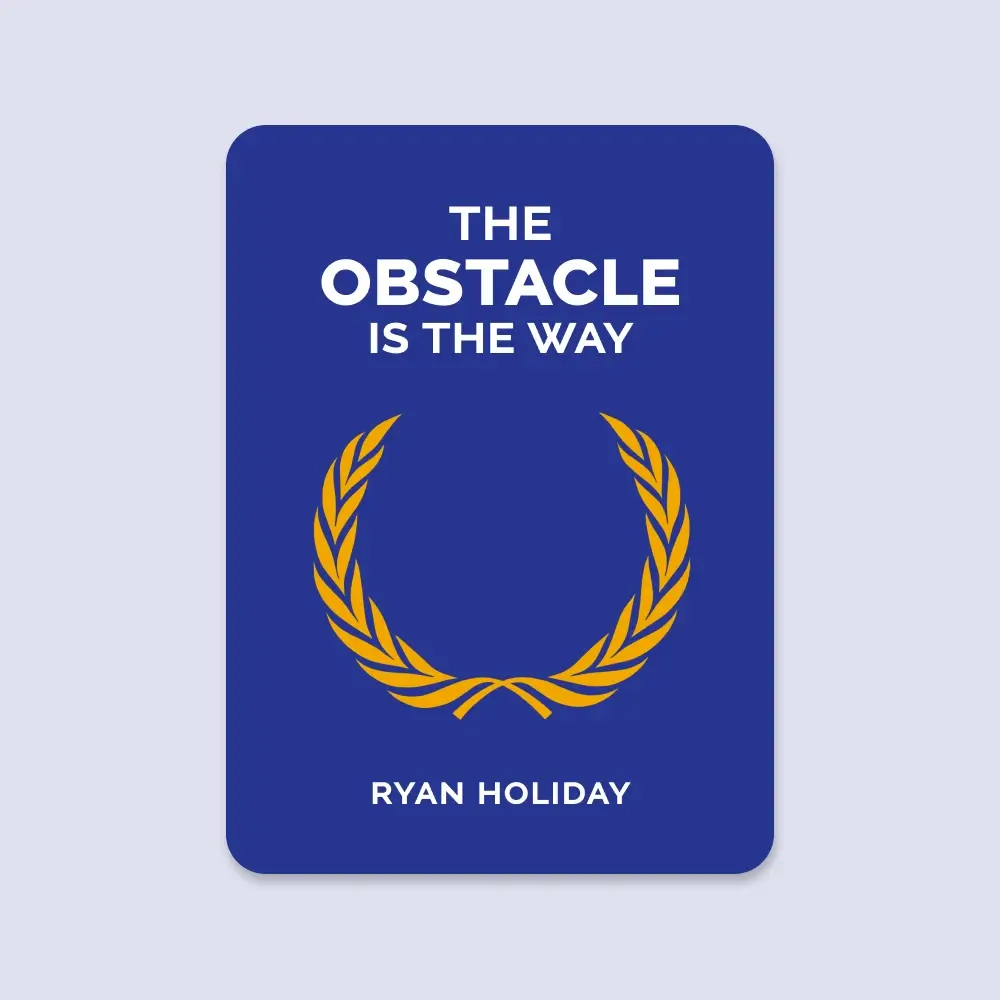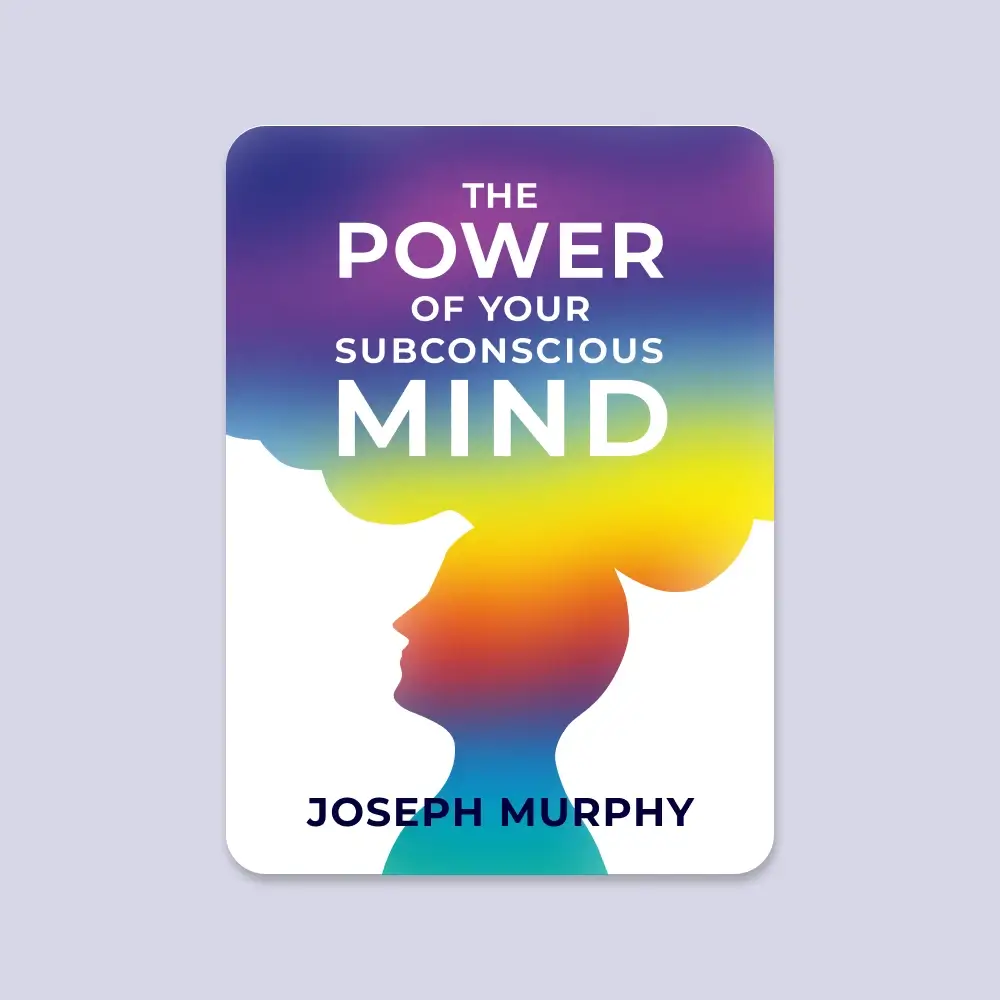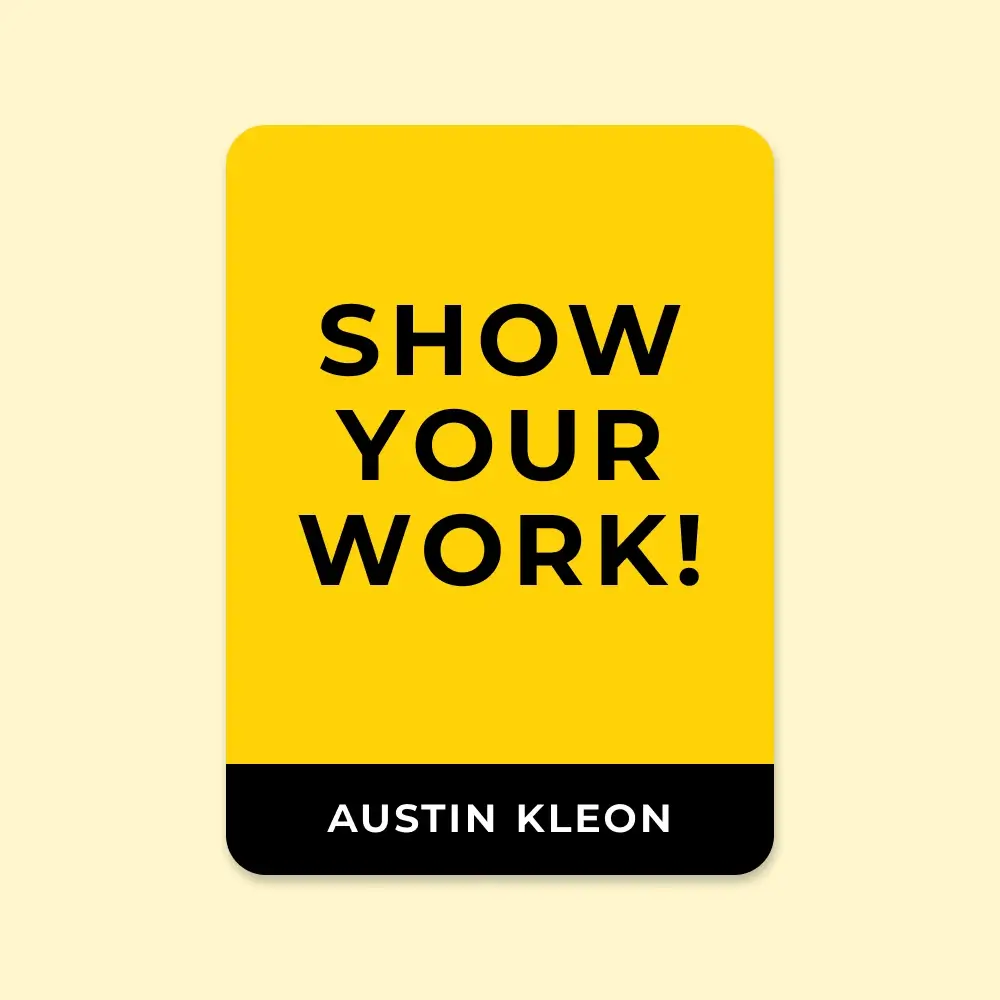
Show Your Work!
🎯 Creativity is Operating, Not Just Talent − Being creative is a way of showing up every day, not something you’re born with.
🌐 Be Findable − It’s not enough to be good—you must also be discoverable. Share your work, your process, and your passions.
🧑🎓 Embrace Amateur Spirit − Amateurs are bold, curious, and open. They share what they’re learning and inspire others by doing.
📸 Document, Don’t Just Create − Keep track of your process through photos, notes, or videos. Turn the invisible work into visible, shareable material.
📮 Share Something Small Every Day − Little daily updates create momentum and a lasting archive of your work. Don’t wait for perfection—just post.
🧱 Turn Flow into Stock − Use daily content (flow) to build long-term value (stock). Blogs are great for turning scattered ideas into durable assets.
🖥 Create Your Space Online − Carve out a home for yourself on the internet. Use it to express, invent, and connect.
🔁 Give Away to Get More − Sharing work builds your audience. Giving away value replenishes creativity and leads to unexpected rewards.
💌 Own Your Influences − Don’t hide what inspires you. Share your taste honestly—your heroes, your garbage, your guilty pleasures.
🧾 Credit Generously − Always attribute. Treat others’ work with the care and respect you give your own.
📖 Tell Better Stories − Your work is already telling a story. Learn to shape that narrative clearly, truthfully, and with dignity.
🧑🏫 Teach What You Know − Share your knowledge through tutorials, lists, and walkthroughs. Teaching builds connection and deepens your own understanding.
🤝 Be a Fan First − Support others, share their work, and be a good digital citizen. If you want attention, give it freely.
👥 Attract Your Kind − Do what you love and talk about it—your tribe will find you. Focus on quality followers, not quantity.
🧛♂️ Avoid Vampires − Stay away from people, jobs, or projects that drain you. Pay attention to what energizes you.
🌐 Turn Online Friends into Real Ones − Use the internet to connect—but don’t forget the power of face-to-face relationships.
🛡 Prepare for Criticism − More visibility means more feedback. Learn to take punches. Protect your sensitive work, but don’t fear sharing.
💬 Tell the Right Story to the Right People − Not everyone’s opinion matters. Focus on people who get what you’re doing.
💰 Sell Without Selling Out − Charge when you’re ready. Be fair and honest. Use what you earn to keep doing the work you love.
📢 Promote Others as You Rise − Success comes with responsibility. Elevate your mentors, peers, and community.
🧭 Keep Moving Forward − Finish one project and use it to fuel the next. Work leads to more work.
📦 Make Room for New Ideas − Let go of what’s old. Destroy your comfort zones. Be a beginner again.
👀 Pay Attention to Who Shows Up − When the right people find your work, listen carefully. They’re the key to your next chapter.
Creativity is not a talent. It is a way of operating. - John Cleese
-
“Be so good they can’t ignore you.” If you just focus on getting really good, Martin says, people will come to you.
-
You don’t really find an audience for your work; they find you. But it’s not enough to be good. In order to be found, you have to be findable.
Give what you have. To someone, it may be better than you dare to think. - Henry Wadsworth Longfellow
-
If you look back closely at history, many of the people who we think of as lone geniuses were actually part of “a whole scene of people who were supporting each other, looking at each other’s work, copying from each other, stealing ideas, and contributing ideas.”
-
Creativity is always, in some sense, a collaboration, the result of a mind connected to other minds.
That’s all any of us are: amateurs. We don’t live long enough to be anything else. - Charlie Chaplin
-
Sometimes, in the process of doing things in an unprofessional way, they make new discoveries.
-
“In the beginner’s mind, there are many possibilities,” said Zen monk Shunryu Suzuki. “In the expert’s mind, there are few.”
-
Amateurs are not afraid to make mistakes or look ridiculous in public. They’re in love, so they don’t hesitate to do work that others think of as silly or just plain stupid.
-
“On the spectrum of creative work, the difference between the mediocre and the good is vast. Mediocrity is, however, still on the spectrum; you can move from mediocre to good in increments. The real gap is between doing nothing and doing something.” Amateurs know that contributing something is better than contributing nothing.
-
Amateurs might lack formal training, but they’re all lifelong learners, and they make a point of learning in the open, so that others can learn from their failures and successes.
-
Sometimes, amateurs have more to teach us than experts.
-
Amateurs—they’ll use whatever tools they can get their hands on to try to get their ideas into the world.
-
Share what you love, and the people who love the same things will find you.
Find your voice, shout it from the rooftops, and keep doing it until the people that are looking for you find you. - Dan Harmon
Remembering that I’ll be dead soon is the most important tool I’ve ever encountered to help me make the big choices in life. Because almost everything—all external expectations, all pride, all fear of embarrassment or failure—these things just fall away in the face of death, leaving only what is truly important. Remembering that you are going to die is the best way I know to avoid the trap of thinking you have something to lose. You are already naked. - Steve Jobs
A lot of people are so used to just seeing the outcome of work. They never see the side of the work you go through to produce the outcome. - Michael Jackson
-
By putting things out there, consistently, you can form a relationship with your customers. It allows them to see the person behind the products.
-
Audiences not only want to stumble across great work, but they, too, long to be creative and part of the creative process. By letting go of our egos and sharing our process, we allow for the possibility of people having an ongoing connection with us and our work, which helps us move more of our product.
In order for connection to happen, we have to allow ourselves to be seen—really seen. - Brené Brown
-
A lot of us go about our work and feel like we have nothing to show for it at the end of the day. But whatever the nature of your work, there is an art to what you do, and there are people who would be interested in that art, if only you presented it to them in the right way.
-
How can you show your work even when you have nothing to show? The first step is to scoop up the scraps and the residue of your process and shape them into some interesting bit of media that you can share. You have to turn the invisible into something other people can see.
-
No one is going to give a damn about your résumé; they want to see what you have made with your own little fingers.
-
Become a documentarian of what you do. Start a work journal: Write your thoughts down in a notebook, or speak them into an audio recorder. Keep a scrapbook. Take a lot of photographs of your work at different stages in your process. Shoot video of you working. This isn’t about making art, it’s about simply keeping track of what’s going on around you.
-
Whether you share it or not, documenting and recording your process as you go along has its own rewards: You’ll start to see the work you’re doing more clearly and feel like you’re making progress. And when you’re ready to share, you’ll have a surplus of material to choose from.
-
Share something small everyday.
Put yourself, and your work, out there every day, and you’ll start meeting some amazing people. - Bobby Solomon
-
Overnight success is a myth. Dig into almost every overnight success story and you’ll find about a decade’s worth of hard work and perseverance.
-
If you’re in the very early stages, share your influences and what’s inspiring you. If you’re in the middle of executing a project, write about your methods or share works in progress. If you’ve just completed a project, show the final product, share scraps from the cutting-room floor, or write about what you learned.
-
A daily dispatch is even better than a résumé or a portfolio, because it shows what we’re working on right now.
-
The form of what you share doesn’t matter. Your daily dispatch can be anything you want—a blog post, an email, a tweet, a YouTube video, or some other little bit of media. There’s no one-size-fits-all plan for everybody.
-
Social media sites are the perfect place to share daily updates. Don’t worry about being on every platform; pick and choose based on what you do and the people you’re trying to reach.
-
Don’t worry about everything you post being perfect. Science fiction writer Theodore Sturgeon once said that 90 percent of everything is crap. The same is true of our own work. The trouble is, we don’t always know what’s good and what sucks. That’s why it’s important to get things in front of others and see how they react.
-
Don’t let sharing your work take precedence over actually doing your work. If you’re having a hard time balancing the two, just set a timer for 30 minutes. Once the timer goes off, kick yourself off the Internet and get back to work.
One day at a time. It sounds so simple. It actually is simple but it isn’t easy: It requires incredible support and fastidious structuring. - Russell Brand
Make no mistake: This is not your diary. You are not letting it all hang out. You are picking and choosing every single word. - Dani Shapiro
-
Always remember that anything you post to the Internet has now become public. “The Internet is a copy machine,” writes author Kevin Kelly. “Once anything that can be copied is brought into contact with the Internet, it will be copied, and those copies never leave.” Ideally, you want the work you post online to be copied and spread to every corner of the Internet, so don’t post things online that you’re not ready for everyone in the world to see.
-
Be open, share imperfect and unfinished work that you want feedback on, but don’t share absolutely everything. There’s a big, big difference between sharing and over-sharing.
-
If you’re unsure about whether to share something, let it sit for 24 hours. Put it in a drawer and walk out the door. The next day, take it out and look at it with fresh eyes. Ask yourself, “Is this helpful? Is it entertaining? Is it something I’d be comfortable with my boss or my mother seeing?”
If you work on something a little bit every day, you end up with something that is massive. - Kenneth Goldsmith
-
“Flow is the feed. It’s the posts and the tweets. It’s the stream of daily and sub-daily updates that remind people you exist. Stock is the durable stuff. It’s the content you produce that’s as interesting in two months (or two years) as it is today. It’s what people discover via search. It’s what spreads slowly but surely, building fans over time.” Your stock is best made by collecting, organizing, and expanding upon your flow.
-
Social media sites function a lot like public notebooks—they’re places where we think out loud, let other people think back at us, then hopefully think some more. But the thing about keeping notebooks is that you have to revisit them in order to make the most out of them. You have to flip back through old ideas to see what you’ve been thinking. Once you make sharing part of your daily routine, you’ll notice themes and trends emerging in what you share. You’ll find patterns in your flow.
-
Small things, over time, can get big.
Carving out a space for yourself online, somewhere where you can express yourself and share your work, is still one of the best possible investments you can make with your time. - Andy Baio
-
A blog is the ideal machine for turning flow into stock.
-
One little blog post is nothing on its own, but publish a thousand blog posts over a decade, and it turns into your life’s work.
-
Don’t think of your website as a self-promotion machine, think of it as a self-invention machine.
-
Be concerned with doing good work . . . and if you can build a good name, eventually that name will be its own currency.”
The problem with hoarding is you end up living off your reserves. Eventually, you’ll become stale. If you give away everything you have, you are left with nothing. This forces you to look, to be aware, to replenish. . . . Somehow the more you give away, the more comes back to you. - Paul Arden
- Your influences are all worth sharing because they clue people in to who you are and what you do—sometimes even more than your own work.
I don’t believe in guilty pleasures. If you f—ing like something, like it. - Dave Grohl
-
“Dumpster diving” is one of the jobs of the artist—finding the treasure in other people’s trash, sifting through the debris of our culture, paying attention to the stuff that everyone else is ignoring, and taking inspiration from the stuff that people have tossed aside for whatever reasons.
-
All it takes to uncover hidden gems is a clear eye, an open mind, and a willingness to search for inspiration in places other people aren’t willing or able to go.
-
We all love things that other people think are garbage. You have to have the courage to keep loving your garbage, because what makes us unique is the diversity and breadth of our influences, the unique ways in which we mix up the parts of culture others have deemed “high” and the “low.”
-
When you find things you genuinely enjoy, don’t let anyone else make you feel bad about it. Don’t feel guilty about the pleasure you take in the things you enjoy. Celebrate them. When you share your taste and your influences, have the guts to own all of it.
-
Being open and honest about what you like is the best way to connect with people who like those things, too.
Do what you do best and link to the rest. - Jeff Jarvis
-
If you share the work of others, it’s your duty to make sure that the creators of that work get proper credit. Crediting work in our copy-and-paste age of reblogs and retweets can seem like a futile effort, but it’s worth it, and it’s the right thing to do. You should always share the work of others as if it were your own, treating it with respect and care.
-
Attribution is all about providing context for what you’re sharing: what the work is, who made it, how they made it, when and where it was made, why you’re sharing it, why people should care about it, and where people can see some more work like it. Attribution is about putting little museum labels next to the stuff you share.
To fake a photograph, all you have to do is change the caption. To fake a painting, change the attribution. - Errol Morris
-
Your work doesn’t exist in a vacuum. Whether you realize it or not, you’re already telling a story about your work. Every email you send, every text, every conversation, every blog comment, every tweet, every photo, every video—they’re all bits and pieces of a multimedia narrative you’re constantly constructing.
-
If you want to be more effective when sharing yourself and your work, you need to become a better storyteller. You need to know what a good story is and how to tell one.
‘The cat sat on a mat’ is not a story. ‘The cat sat on the dog’s mat’ is a story. - John le Carré
In the first act, you get your hero up a tree. The second act, you throw rocks at him. For the third act, you let him down. - George Abbott
-
Emma Coats, a former storyboard artist at Pixar, outlined the basic structure of a fairy tale as a kind of Mad Lib that you can fill in with your own elements: “Once upon a time, there was __. Every day, __. One day, __. Because of that, __. Because of that, __. Until finally, __.” Pick your favorite story and try to fill in the blanks. It’s striking how often it works.
-
Everybody loves a good story, but good storytelling doesn’t come easy to everybody. It’s a skill that takes a lifetime to master. So study the great stories and then go find some of your own. Your stories will get better the more you tell them.
-
Just because you’re trying to tell a good story about yourself doesn’t mean you’re inventing fiction. Stick to nonfiction. Tell the truth and tell it with dignity and self-respect.
-
If you’re employed, but you don’t feel good about your job title, ask yourself why that is. Maybe you’re in the wrong line of work, or maybe you’re not doing the work you’re supposed to be doing.
-
George Orwell wrote: “Autobiography is only to be trusted when it reveals something disgraceful.”
-
Bios are not the place to practice your creativity. We all like to think we’re more complex than a two-sentence explanation, but a two-sentence explanation is usually what the world wants from us. Keep it short and sweet.
-
Strike all the adjectives from your bio. If you take photos, you’re not an “aspiring” photographer, and you’re not an “amazing” photographer, either. You’re a photographer. Don’t get cute. Don’t brag. Just state the facts. One more thing: Unless you are actually a ninja, a guru, or a rock star, don’t ever use any of those terms in your bio. Ever.
Whatever we say, we’re always talking about ourselves. - Alison Bechdel
- Teach what you know.
The impulse to keep to yourself what you have learned is not only shameful, it is destructive. Anything you do not give freely and abundantly becomes lost to you. You open your safe and find ashes. - Annie Dillard
-
Teaching doesn’t mean instant competition. Just because you know the master’s technique doesn’t mean you’re going to be able to emulate it right away.
-
The minute you learn something, turn around and teach it to others. Share your reading list. Point to helpful reference materials. Create some tutorials and post them online. Use pictures, words, and video. Take people step-by-step through part of your process.
-
Teaching people doesn’t subtract value from what you do, it actually adds to it. When you teach someone how to do your work, you are, in effect, generating more interest in your work. People feel closer to your work because you’re letting them in on what you know.
-
When you share your knowledge and your work with others, you receive an education in return.
When people realize they’re being listened to, they tell you things. - Richard Ford
-
If you want to be a writer, you have to be a reader first.
-
If you want fans, you have to be a fan first. If you want to be accepted by a community, you have to first be a good citizen of that community. If you’re only pointing to your own stuff online, you’re doing it wrong. You have to be a connector. The writer Blake Butler calls this being an open node. If you want to get, you have to give. If you want to be noticed, you have to notice. Shut up and listen once in a while. Be thoughtful. Be considerate. Don’t turn into human spam. Be an open node.
What you want is to follow and be followed by human beings who care about issues you care about. This thing we make together. This thing is about hearts and minds, not eyeballs. - Jeffrey Zeldman
-
Stop worrying about how many people follow you online and start worrying about the quality of people who follow you. Don’t waste your time reading articles about how to get more followers. Don’t waste time following people online just because you think it’ll get you somewhere. Don’t talk to people you don’t want to talk to, and don’t talk about stuff you don’t want to talk about.
-
If you want followers, be someone worth following.
-
If you want to be interesting, you have to be interested.
-
Make stuff you love and talk about stuff you love and you’ll attract people who love that kind of stuff. It’s that simple.
Whatever excites you, go do it. Whatever drains you, stop doing it. - Derek Sivers
- Vampire Test - It’s a simple way to know who you should let in and out of your life. If, after hanging out with someone you feel worn out and depleted, that person is a vampire. If, after hanging out with someone you still feel full of energy, that person is not a vampire. The Vampire Test works on many things in our lives, not just people—you can apply it to jobs, hobbies, places, etc.
Part of the act of creating is in discovering your own kind. They are everywhere. But don’t look for them in the wrong places. - Henry Miller
You and I will be around a lot longer than Twitter, and nothing substitutes face to face. - Rob Delaney
- Meeting people online is awesome, but turning them into IRL(in real life) friends is even better.
I ain’t going to give up. Every time you think I’m one place, I’m going to show up someplace else. I come pre-hated. Take your best shot. - Cyndi Lauper
-
When you put your work out into the world, you have to be ready for the good, the bad, and the ugly. The more people come across your work, the more criticism you’ll face.
-
Relax and breathe. The trouble with imaginative people is that we’re good at picturing the worst that could happen to us. Fear is often just the imagination taking a wrong turn. Bad criticism is not the end of the world. As far as I know, no one has ever died from a bad review. Take a deep breath and accept whatever comes.
-
Strengthen your neck. The way to be able to take a punch is to practice getting hit a lot. Put out a lot of work. Let people take their best shot at it. Then make even more work and keep putting it out there. The more criticism you take, the more you realize it can’t hurt you.
-
Roll with the punches. Keep moving. Every piece of criticism is an opportunity for new work. You can’t control what sort of criticism you receive, but you can control how you react to it. Sometimes when people hate something about your work, it’s fun to push that element even further. To make something they’d hate even more. Having your work hated by certain people is a badge of honor.
-
Protect your vulnerable areas. If you have work that is too sensitive or too close to you to be exposed to criticism, keep it hidden. But remember what writer Colin Marshall says: “Compulsive avoidance of embarrassment is a form of suicide.” If you spend your life avoiding vulnerability, you and your work will never truly connect with other people.
-
Keep your balance. You have to remember that your work is something you do, not who you are. This is especially hard for artists to accept, as so much of what they do is personal. Keep close to your family, friends, and the people who love you for you, not just the work.
The trick is not caring what EVERYBODY thinks of you and just caring about what the RIGHT people think of you. - Brian Michael Bendis
-
A troll is a person who isn’t interested in improving your work, only provoking you with hateful, aggressive, or upsetting talk. You will gain nothing by engaging with these people. Don’t feed them, and they’ll usually go away.
-
The worst troll is the one that lives in your head. It’s the voice that tells you you’re not good enough, that you suck, and that you’ll never amount to anything.
-
“There’s never a space under paintings in a gallery where someone writes their opinion,” says cartoonist Natalie Dee.
Sellout . . . I’m not crazy about that word. We’re all entrepreneurs. To me, I don’t care if you own a furniture store or whatever—the best sign you can put up is sold out. - Bill Withers
-
Don’t be jealous when the people you like do well—celebrate their victory as if it’s your own.
-
When an audience starts gathering for the work that you’re freely putting into the world, you might eventually want to take the leap of turning them into patrons. The easiest way to do this is to simply ask for donations: Put a little virtual tip jar or a donate now button on your website.
-
Whether you ask for donations, crowdfund, or sell your products or services, asking for money in return for your work is a leap you want to take only when you feel confident that you’re putting work out into the world that you think is truly worth something. Don’t be afraid to charge for your work, but put a price on it that you think is fair.
-
The model is very simple: They give away great stuff on their sites, they collect emails, and then when they have something remarkable to share or sell, they send an email. You’d be amazed at how well the model works.
We don’t make movies to make money, we make money to make more movies. - Walt Disney
-
Yet a life of creativity is all about change—moving forward, taking chances, exploring new frontiers. “The real risk is in not changing,” said saxophonist John Coltrane.
-
Be ambitious. Keep yourself busy. Think bigger. Expand your audience. Don’t hobble yourself in the name of “keeping it real,” or “not selling out.” Try new things. If an opportunity comes along that will allow you to do more of the kind of work you want to do, say Yes. If an opportunity comes along that would mean more money, but less of the kind of work you want to do, say No.
There is no misery in art. All art is about saying yes, and all art is about its own making. - John Currin
-
When you have success, it’s important to use any dough, clout, or platform you’ve acquired to help along the work of the people who’ve helped you get to where you are. Extol your teachers, your mentors, your heroes, your influences, your peers, and your fans. Give them a chance to share their own work. Throw opportunities their way.
-
“The biggest problem of success is that the world conspires to stop you doing the thing that you do, because you are successful,” writes author Neil Gaiman.
-
You just have to be as generous as you can, but selfish enough to get your work done.
Above all, recognize that if you have had success, you have also had luck—and with luck comes obligation. You owe a debt, and not just to your gods. You owe a debt to the unlucky. - Michael Lewis
-
Every career is full of ups and downs, and just like with stories, when you’re in the middle of living out your life and career, you don’t know whether you’re up or down or what’s about to happen next.
-
“If you want a happy ending,” actor Orson Welles wrote, “that depends, of course, on where you stop your story.”
-
The people who get what they’re after are very often the ones who just stick around long enough. It’s very important not to quit prematurely.
-
“In our business you don’t quit,” says comedian Joan Rivers. “You’re holding on to the ladder. When they cut off your hands, hold on with your elbow. When they cut off your arms, hold on with your teeth. You don’t quit because you don’t know where the next job is coming from.”
Work is never finished, only abandoned. - Paul Valéry
- Here’s how you do it: Instead of taking a break in between projects, waiting for feedback, and worrying about what’s next, use the end of one project to light up the next one. Just do the work that’s in front of you, and when it’s finished, ask yourself what you missed, what you could’ve done better, or what you couldn’t get to, and jump right into the next project.
We work because it’s a chain reaction, each subject leads to the next. - Charles Eames
The minute you stop wanting something you get it. - Andy Warhol
- Three prime spots to turn off our brains and take a break from our connected lives:
- Commute. A moving train or subway car is the perfect time to write, doodle, read, or just stare out the window. (If you commute by car, audiobooks are a great way to safely tune out.) A commute happens twice a day, and it nicely separates our work life from our home life.
- Exercise. Using our body relaxes our mind, and when our mind gets relaxed, it opens up to having new thoughts. Jump on the treadmill and let your mind go. If you’re like me and you hate exercise, get a dog—dogs won’t let you get away with missing a day.
- Nature. Go to a park. Take a hike. Dig in your garden. Get outside in the fresh air. Disconnect from anything and everything electronic.
Every two or three years, I knock off for a while. That way, I’m constantly the new girl in the whorehouse. - Robert Mitchum
Whenever Picasso learned how to do something, he abandoned it. - Milton Glaser
-
When you feel like you’ve learned whatever there is to learn from what you’re doing, it’s time to change course and find something new to learn so that you can move forward. You can’t be content with mastery; you have to push yourself to become a student again.
-
When you get rid of old material, you push yourself further and come up with something better. When you throw out old work, what you’re really doing is making room for new work.
-
Show your work, and when the right people show up, pay close attention to them, because they’ll have a lot to show you.
